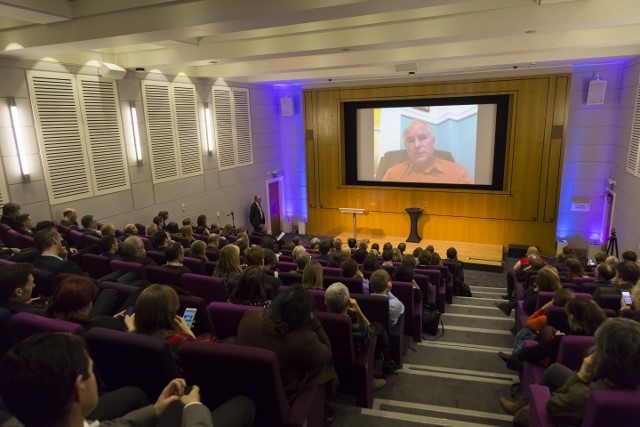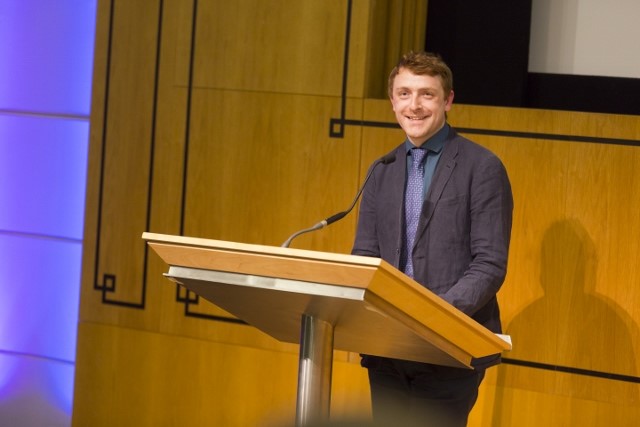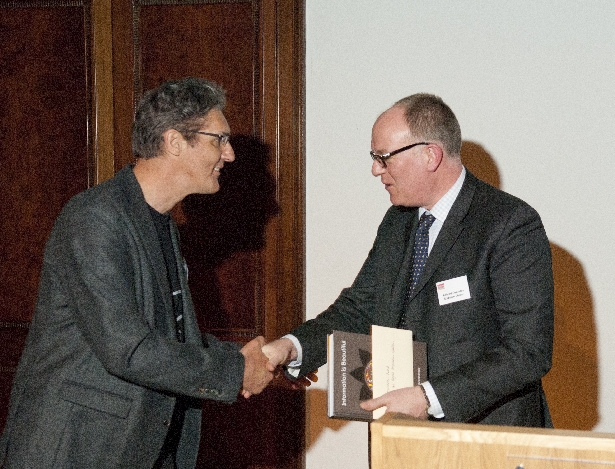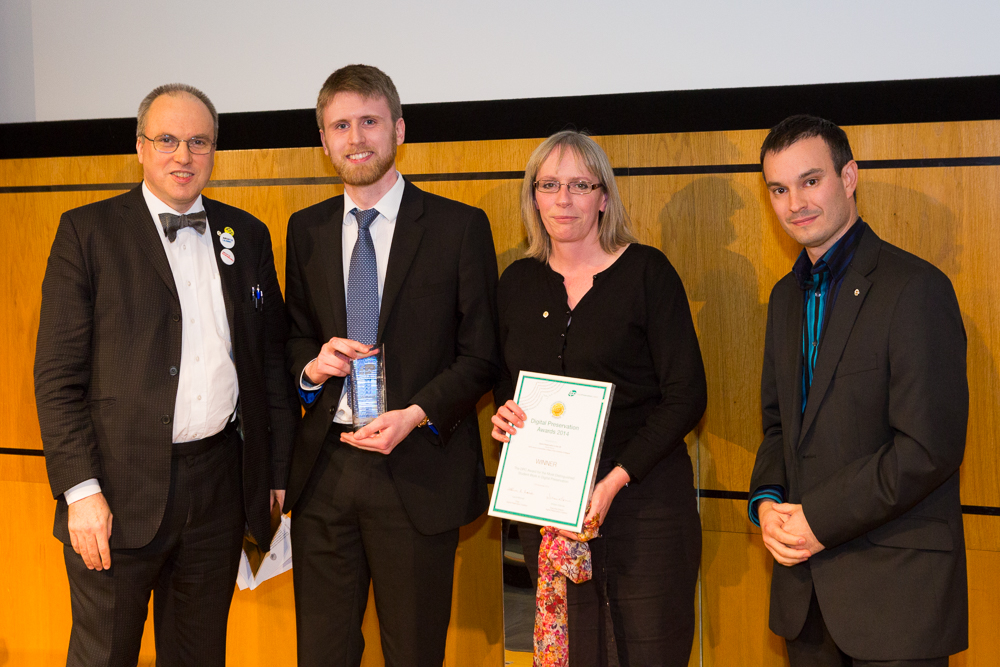Awards
Digital Preservation Awards 2024: Eligibility and Frequently Asked Questions (FAQs)
Scope
-
The Judges will assume a broad definition of digital preservation: projects which describe themselves with specialist terms like ‘conservation’, ‘continuity’, ‘curation’, ‘legacy’, ‘permanent accessibility’, ‘sustainment’ or ‘sustainability’ will be eligible so long as they can demonstrate that they are working towards a sustainable future for our digital assets. Typically, digitization projects will not be eligible unless they offer a specific deliverable that will improve long term access to the digital estate. The Judges’ decision will be final, and no discussion will be entered into.
Deadline
-
There will be no extensions to the deadline.
Who can apply?
-
The awards are open to all. They seek to include entries from all organization types, across all sectors – public, private, for-profit, and non-profit and nominees do not need to be members of the DPC. The awards are international in scope and the project may have been carried out anywhere in the world; Judges will be looking to see how results and lessons learned are being shared with the wider digital preservation community so that they may also learn from the efforts undertaken. Nominations must be supported by senior management within your institution and nominations based on an external grant or commission should be supported by the grant giving agency or commissioning agent. Joint nominations are welcome from individuals or teams working in the public or private sectors, though a single point of contact must be agreed. There is no fee to enter the Digital Preservation Awards.
Do I need support from my manager?
-
Yes. The purpose of the Digital Preservation Awards is about raising awareness about digital preservation. By seeking the approval of management, we are asking you to undertake a modest amount of internal advocacy. For the purposes of the student award, the course convener or head of department is effectively the senior manager. Please address your letter of Support to the Judging Panel.
Why is there a timeframe?
-
The Awards are given for initiatives that were completed between 1st August 2022 and 31st July 2024 which is the period since the last Digital Preservation Awards, though Judges will be asked to use their discretion in the admittance of nominations which have been completed outside that period. NB: although the completion date should fall between the dates given, work may have begun at any date.
What can we submit?
-
Any project or initiative which has contributed towards a sustainable future for our digital assets. By ‘project’ we mean any sustained and unified effort that works towards a discrete and definitive outcome. This might include the development and delivery of innovative services or a single program of work. Pilot projects and full-scale projects can be submitted though nominees may wish to signal the relationship between them. Combinations of projects which happen to operate in the same sphere, but which have no structural linkage should be avoided and large or complex projects are encouraged to concentrate on specific deliverables which can be more readily understood. Small projects with modest outcomes are particularly encouraged to apply because impact will be assessed in proportion to the total resource expended.
Will you supply travel grants?
-
Where necessary we will provide a contribution towards travel for two participants to attend the ceremony. Nominees wishing to attend the iPres Conference must register for this separately, fees for attending the conference will not be covered.
Will you give feedback about our nomination?
-
Yes. All nominees get feedback from the Judges and shortlisted candidates will also receive feedback from their peers gathered from the public vote. The feedback will always be constructive, and the Judges encourage nominees to append these comments to their professional and organizational CVs.
Can we promote the fact that we have submitted a nomination, been shortlisted or have won an award?
-
Yes, we actively encourage you to do so. Where possible we will help you by providing supportive quotes or photography and will make time for press calls. The awards are run to engage the widest possible community in digital preservation, so we call on everyone interested in the awards to help raise their profile.
Can I ask your advice about completing my nomination form?
-
Yes, but we reserve the right to publish that advice on the FAQ section of the Digital Preservation Awards Website to ensure that any points of clarification are available to all. We will keep such advice anonymous. There is a comment function on the FAQ section of the website that you can use to ask questions.
Can I nominate someone for the DPC Fellowship Award?
-
DPC members will be formally invited to submit their nominations for the Fellowship Award with the online vote in June 2024. In response to this invitation, members should include their nominations as part of the voting card, or email their nominations to This email address is being protected from spambots. You need JavaScript enabled to view it. and we will collate a list for the Judges’ consideration in July. At this stage, the Judges will also submit their own nominations if not already made and a winner will be decided by the Judges only, from this list. The winner of the Fellowship Award will be decided upon by the Judging Panel from this list of names.
Did this page answer your question?
If not, email This email address is being protected from spambots. You need JavaScript enabled to view it. or add your question to the comments below...
Digital Preservation Awards 2024: How to enter
The Digital Preservation Awards is now closed for nominations
Applications
All nominees should read the Nomination Pack ( DPA24A ) and submit their nominations using the online submission form, which may be accessed below, and must include the following:
-
An indication of the awards category for which the nomination is being made.
Please indicate the awards category for which the nomination is being made. The same nomination may be made to multiple categories if the criteria is fully met for each. Please note that Judges reserve the right to move nominations into the category they think fits best.
-
A brief summary of the project of no more than 100 words. This wording will be used on publicity material and should be as concise and clear as possible.
The summary text should be written for a lay audience and as accessible as possible – imagine it being reproduced in a newspaper report of winning the award. This is likely to be included on the website and in other communications if you are selected as a finalist.
-
A project description of no more than 1000 words, setting out the nature and purpose of the project, and why it is considered to be a potential Award-winner. The project should demonstrate leadership and advancement in the digital preservation arena.
This longer, more detailed text will be used by DPC members and the Judges to assess nominations in the members’ vote. It is in this description that nominations should be more expansive and assume more knowledge, bearing in mind the diversity of the Coalition and its partners. You may include images and diagrams, although these should be genuine visual aids that help clarify the concepts described in the text. An over-abundance of diagrams may be considered suggestive of a text that needs to be improved.
Diagrams are not included in the word count. You may also include hyperlinks, although please note that the Judges are instructed to assess nominations purely on the merits of the evidence presented to them in the nomination forms (and for finalists, in the subsequent interview). Therefore, you should not require Judges to follow a hyperlink or expect that they will.
Information included in Section four: Supporting Statements can and should be repeated in the Long Description as the two have different functions. The Judges will have access to the complete nomination form and therefore any text repeated between the two. However, finalists will be presented to a vote of the members of the DPC and voters will be given the long description as part of the ballot paper without the supporting statements from Section Four. Furthermore, it is our expectation that our designated contacts in DPC members will cascade the long descriptions through their own organizations so that the vote is cast as a corporate decision. Therefore, we recommend that the long description is written for a lay audience.
Bear in mind when writing both the Summary and Long Description that:
a) the DPC will receive a large number of applications and so good writing will help your application stand out; and
b) Judges come from a range of backgrounds including technology experts, business managers, archivists and academics. Whilst expert in their own fields they may not be expert in dealing with your concerns. It will therefore help the nomination if you are clear and concise with your language.
-
A brief account of how the nomination meets each of the key criteria
-
Up to three images good quality illustrating the project/team or individuals are requested. These may also be used for publicity at finalist stage.
Examples of good images to be included are: team photos, project logos, location shots, photos of any products associated with the nominations – particularly in use, process diagrams (without too much text). These should be provided as hi-res jpegs.
-
The nomination should also be accompanied by a letter of support from a senior manager within the institution.
The reason we seek senior management approval is to allow for appropriate internal advocacy and, to a lesser extent, to ensure we do not receive competing nominations from the same institution or project. A senior manager may be anyone within your organization’s management team, in a position more senior than your own. The letter could be a scanned copy of referral or an email – as long as the senior manager in question is made aware of your work and is happy to support it.
The Judges have been very clear in welcoming all kinds of applications, including personal contributions undertaken outside of an institutional framework. Therefore, the absence of a letter of support should not become a barrier to submission e.g., in the case that the project was undertaken in a personal capacity, with no institutional affiliation.
Please use the offline form DPA24B for a checklist of items you will need to enter the awards and come to the online submission form with all the information you need prepared, and to hand.
Submissions
The Digital Preservation Awards is now closed for nominations. Please contact This email address is being protected from spambots. You need JavaScript enabled to view it..
General Provisions
The following provisions apply across all categories of the Awards:
-
The judges’ decisions are final
-
Any attempts to influence the judges will result in disqualification
-
All nominations must be submitted on the relevant nomination form
-
The judging criteria published for each award are for guidance: the conditions are not negotiable
-
With the exception of the student award, institutions are welcome to make multiple nominations, even if these end up in competition with each other. The judges welcome the opportunity to judge between them.
-
Where appropriate, a nomination can be submitted against multiple categories provided a convincing case is made.
-
The judges may change the category of a nomination.
-
Judges may not lead nominations. They must declare their interests at the start of each meeting and must leave the room during consideration of the relevant nominations.
-
The staff of the DPC cannot apply, and contractors cannot nominate work which was initiated and funded directly by the DPC.
-
Projects involving the DPC and DPC staff can be nominated but DPC activities must not be the reason for the nomination.
-
The DPC will only name finalists. Nominations will remain confidential.
-
All nominees will receive feedback.
-
Details of finalists will be used only for the purposes of publicizing the Awards. By submitting a form, nominees signify their consent to such publicity.
The Digital Preservation Awards is now closed for nominations. Please contact This email address is being protected from spambots. You need JavaScript enabled to view it..
Digital Preservation Awards 2016
Watch the ceremony
Watch the Digital Preservation Awards ceremony, filmed live on 30th November 2016 at the Wellcome Collection, London.
Meet the Winners
NCDD and NDE, ‘Constructing a network of nationwide facilities together.’
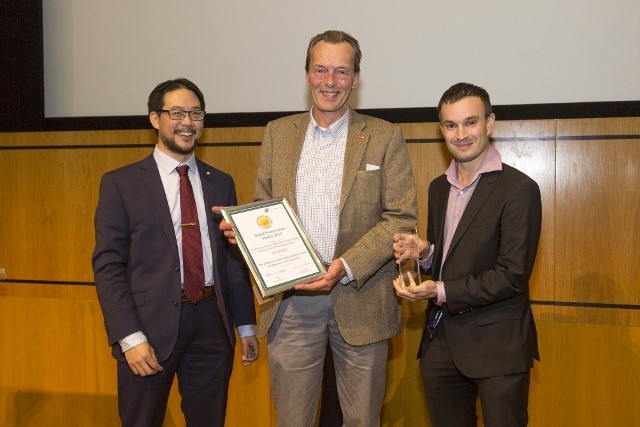 |
2016 Winner of the Software Sustainability Institute (SSI) Award for Research and Innovation,
|
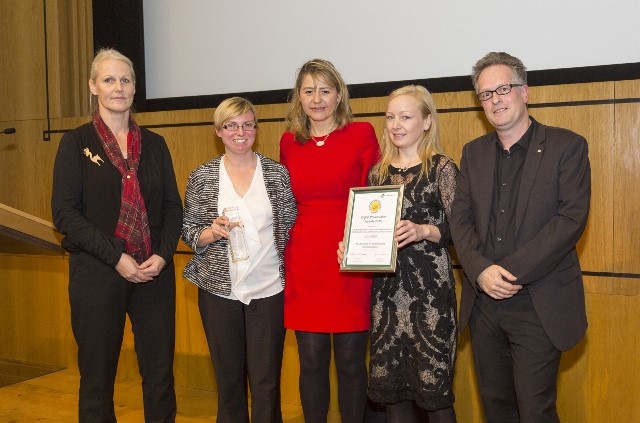 |
2016 Winner of the NCDD Award for Teaching and Communications,
|
Anthea Seles, University College London and ‘The Transferability of Trusted Digital Repository Standards to an East African context.
|
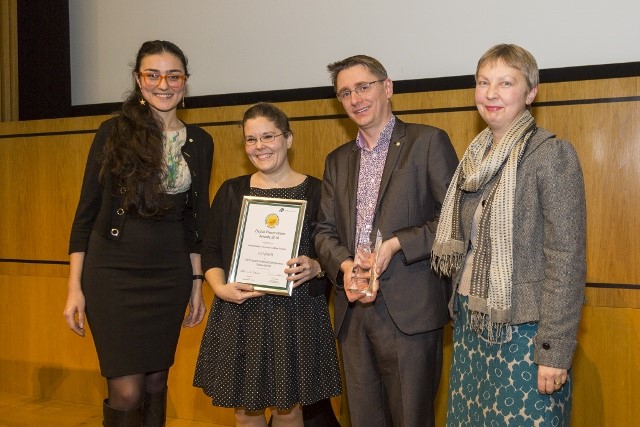 |
2016 Winner of the DPC Award for the Most Distinguished Student Work in Digital Preservation,
|
HSBC, ‘Global Digital Archive System (GDA)'
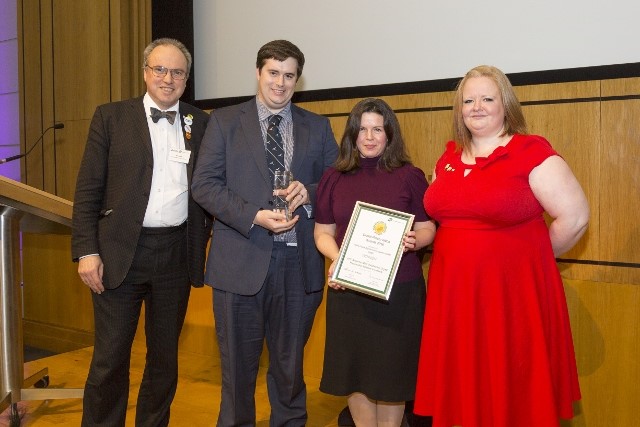 |
2016 Winner of the DPC Award for the Most Outstanding Digital Preservation Initiative in Industry,
|
Amsterdam Museum and Partners, ‘The Digital City revives: A case study of web archaeology.’
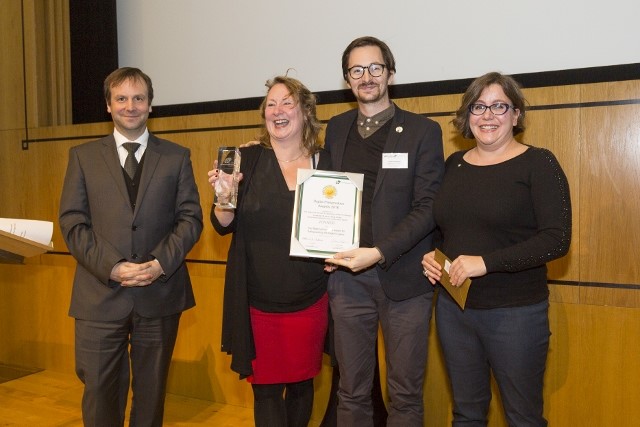 |
2016 Winner of the National Archives Award for Safeguarding the Digital Legacy,
|
Brewster Kahle, Internet Archive
|
|
2016 Winner of the DPC Fellowship Award,
|
Digital Preservation Awards 2016 Finalists
|
Software Sustainability Institute Award for Research and Innovation
|
NCDD Award for Teaching and Communications
|
|
DPC Award for the Most Distinguished Student Work in Digital Preservation
|
DPC Award for the Most Outstanding Digital Preservation Initiative in Industry
|
|
The National Archives Award for Safeguarding the Digital Legacy
|
The DPC extends grateful thanks to our international panel of Judges and all of our sponsors who made DPA2016 a possibility:
|
Adrian Brown, |
Louise Lawson, |
Sandra Collins, |
|
Daniela Duca, |
Manuela Speiser, |
Sharon McMeekin, |
|
Dave Tarrant, |
Marcel Ras, |
Steve Daly, |
|
Dave Thompson, |
Maureen Pennock, |
Tim Gollins, |
|
Joachim Jung, |
Neil Chue Hong, |
William Kilbride, |
|
John Sheridan, |
Paul Wheatley, |
|
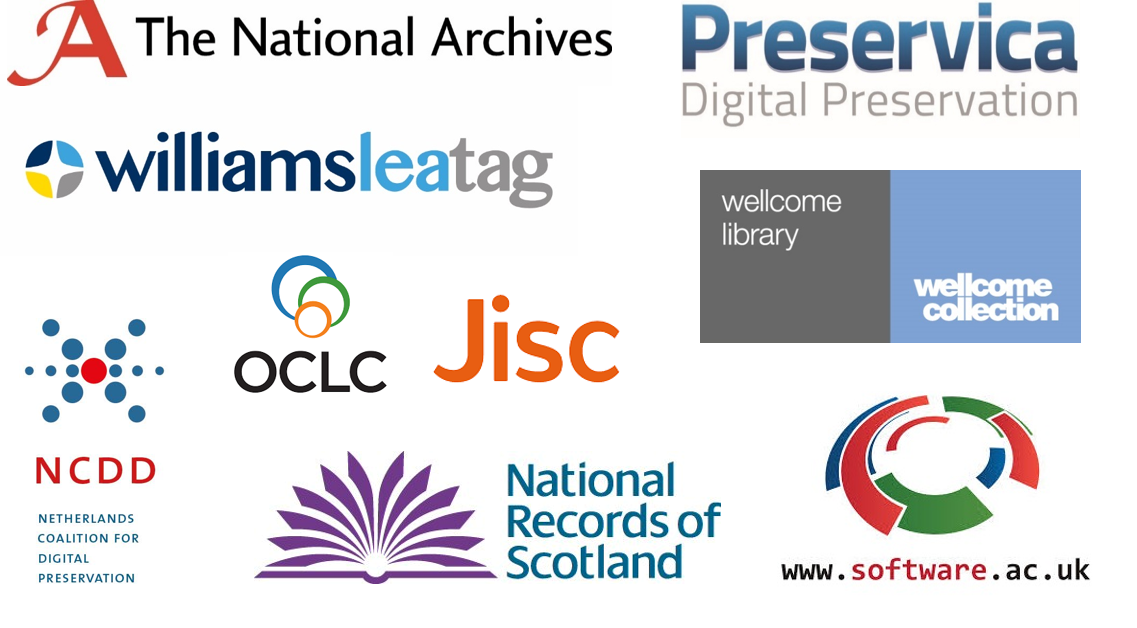
Digital Preservation Awards 2018
Watch the ceremony
Watch the Digital Preservation Awards ceremony, filmed live in November 2018 at the Amsterdam Museum in the Netherlands.
Meet the Winners
Stanford University Libraries, ePADD
|
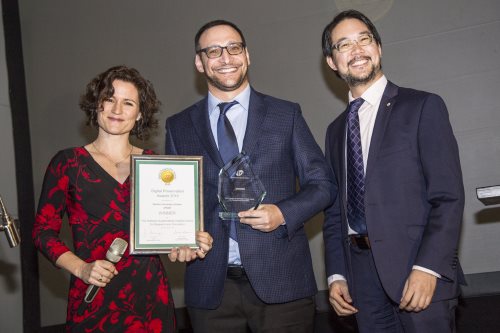 |
2018 Winner of the Software Sustainability Institute (SSI) Award for Research and Innovation
|
Jennifer Allen, Matthew Farrell, Shira Peltzman, Alice Prael and Dorothy Waugh; The Archivist’s Guide to Kryoflux
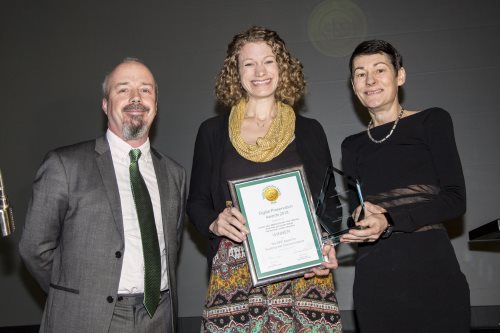 |
2018 Winner of the DPC Award for Teaching and Communications,
|
Anna Oates; University of Illinois at Urbana-Champaign
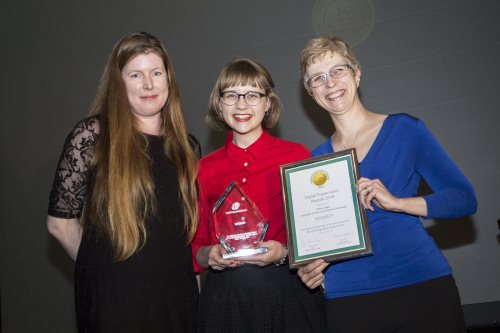 |
2018 Winner of the National Records of Scotland (NRS) Award for the Most Distinguished Student Work in Digital Preservation,
|
Crossrail and Transport for London; Archiving Crossrail
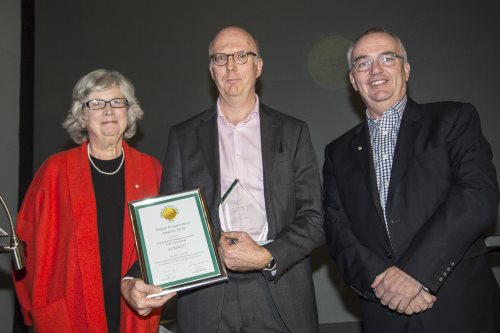 |
2018 Winner of the Open Data Institute (ODI) Award for the Most Outstanding Digital Preservation Initiative in Commerce, Industry and the Third Sector,
|
IFI Irish Film Archive; IFI Loopline Project
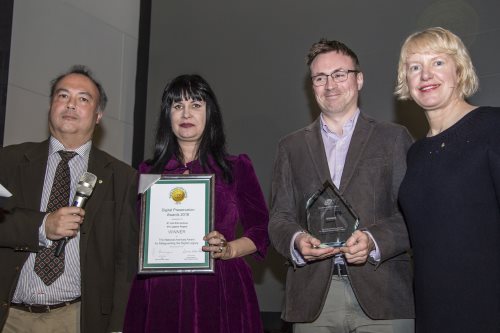 |
2018 Winner of the National Archives Award for Safeguarding the Digital Legacy, presented by Valerie Johnson, The National Archives and Neil JefferiesFrustrated by budget constraints & unresponsive commercial vendors the IFI Irish Film Archive was inspired by the FLOSS community to develop a suite of 55 open source scripts (IFIScripts) that support our digital preservation activities in a sustainable and efficient manner. Solving problems in-house has reduced our maintenance costs and vendor fees and allowed us to take control of our preservation workflows. Not only has IFIScripts helped us to fulfil our digital preservation remit within our limited staff and financial resources, but we sharing all our tools with the preservation community on Githib for others to use and adapt. We are currently completing our first end- to- end application of the IFI Scripts on a preservation projection for a collection of material from a leading Irish film production company called Loopline Films. Watch interview with Kasandra O'Connell and Kieran O'Leary Watch DPA2018 Winners Webinar on the IFI Irish Film Archive Loopline Project |
Barbara Sierman
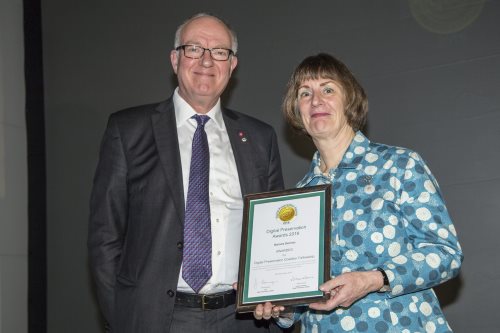 |
2018 Winner of the DPC Fellowship Award,
|
The Digital Preservation Awards 2018 Finalists
|
The Software Sustainability Institute Award for Research and Innovation
|
The DPC Award for Teaching and Communications
|
|
The National Records of Scotland Award for the Most Distinguished Student Work in Digital Preservation
|
The Open Data Institute Award for the Most Outstanding Digital Preservation Initiative in Commerce, Industry and the Third sector |
|
The National Archives Award for Safeguarding the Digital Legacy
In the category of 'Safeguarding the Digital Legacy' The judges also offered a special commendation to the GI Press Collection |
|
The DPC extends grateful thanks to our international panel of Judges and all of our sponsors who made the Digital Preservation Awards 2018 a possibility:
|
David Tarrant, |
Neil Chue Hong, |
Sheila Morrissey, |
|
John Sheridan, |
Neil Grindley, Jisc |
Steve Daly, BBC |
|
Karen Sampson, |
Neil Jefferies, |
Susan Reilly, |
|
Laura Molloy, |
Paul Wheatley, |
Tim Gollins, |
|
Marcel Ras, |
Sally McInnes, |
William Kilbride, |
|
Natalie Harrower, |
Sharon McMeekin, |
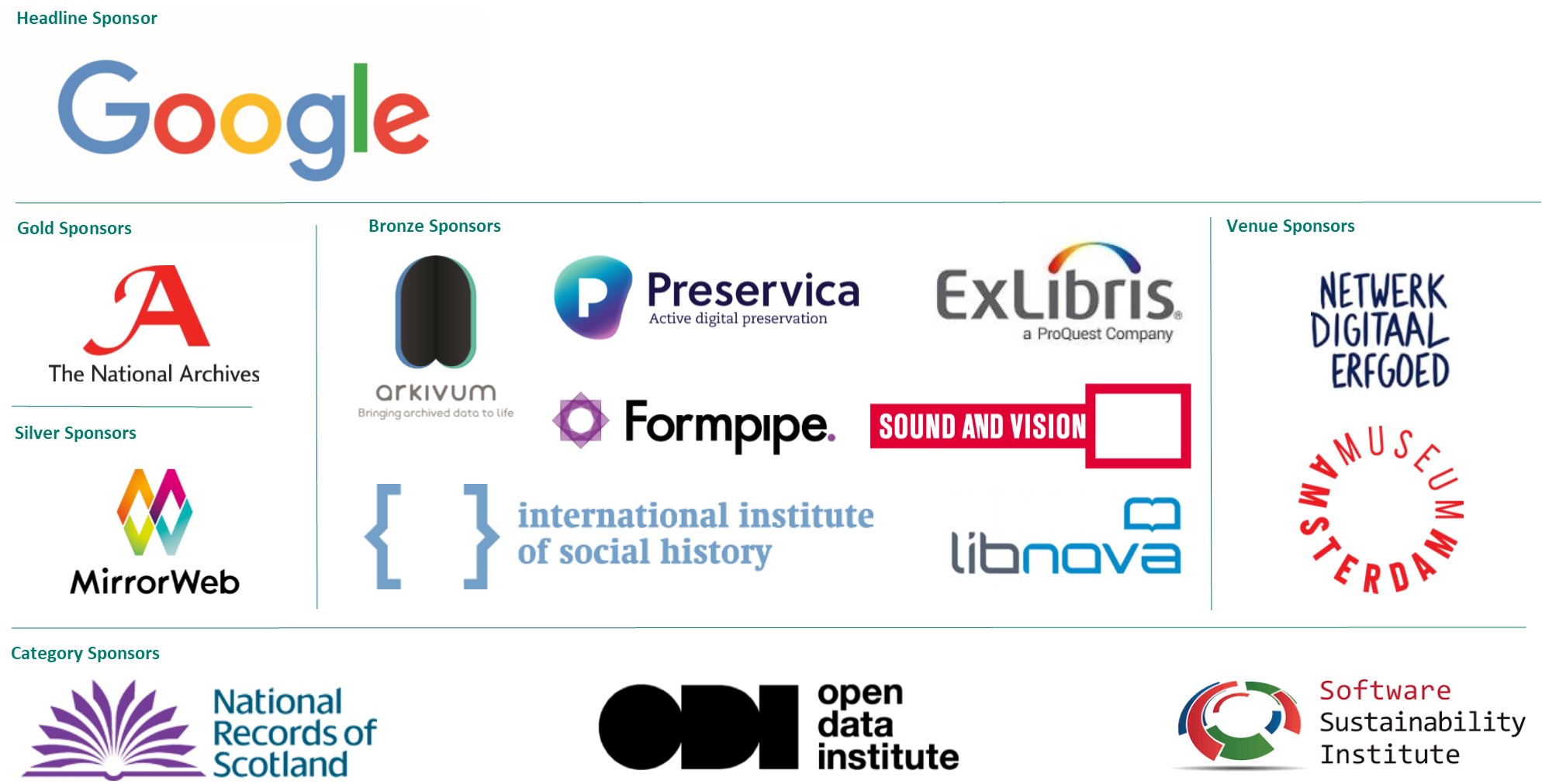
Digital Preservation Awards 2020
Watch the ceremony
Watch the Digital Preservation Awards ceremony, which took place online for World Digital Preservation Day on 5th November 2020.
Meet the Winners
NDSA Levels of Digital Preservation Revision Project
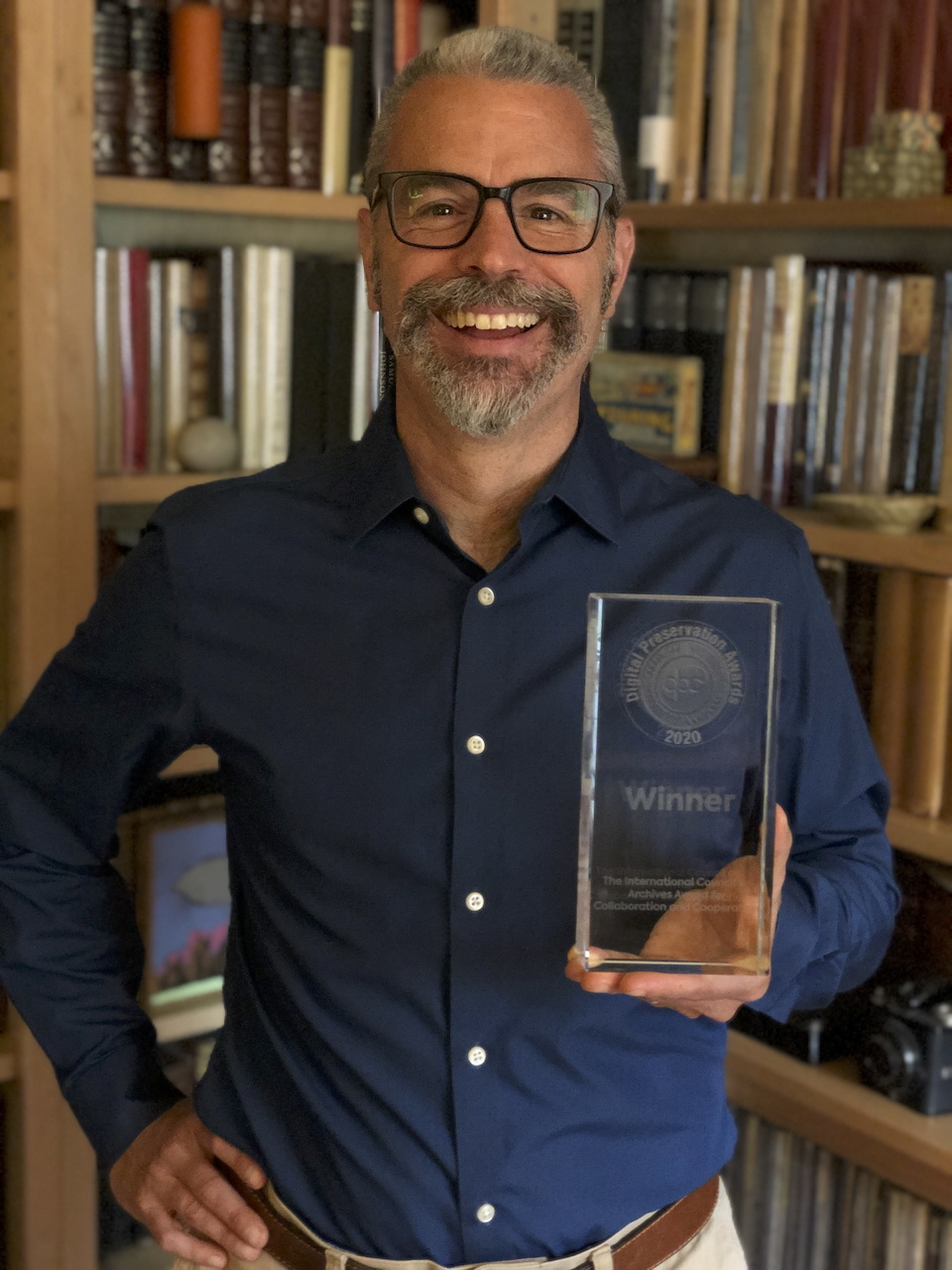
|
2020 Winner of the International Council on Archives Award for Collaboration and Cooperation
|
Levels of Born Digital Access
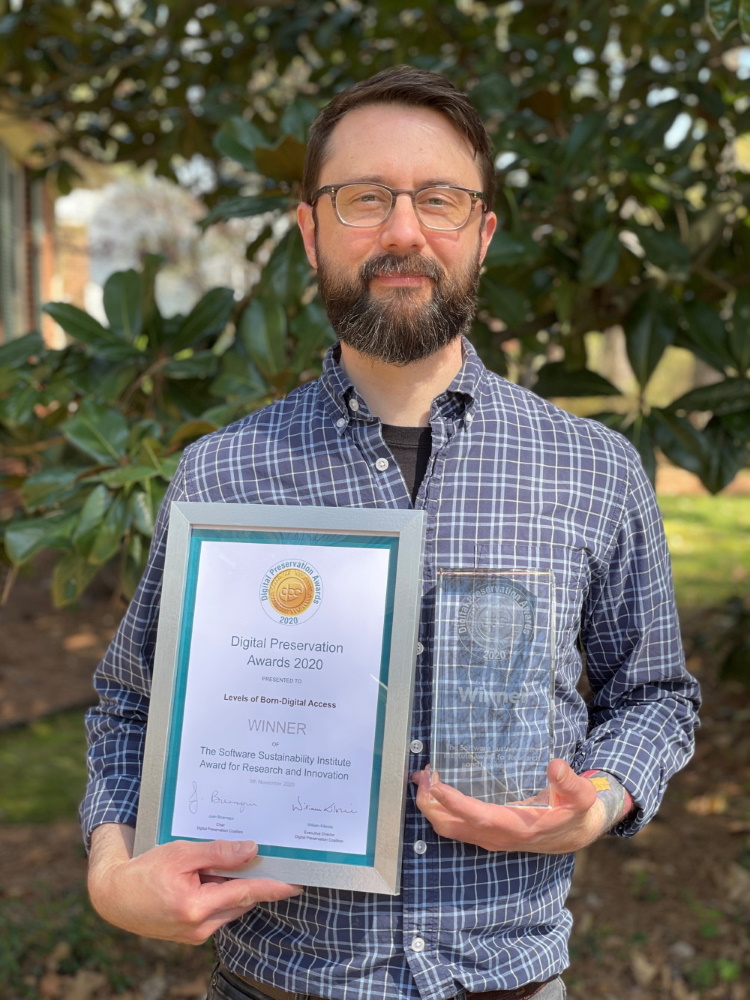
|
2020 Winner of the Software Sustainability Institute (SSI) Award for Research and Innovation
|
Digital Records Curation Programme
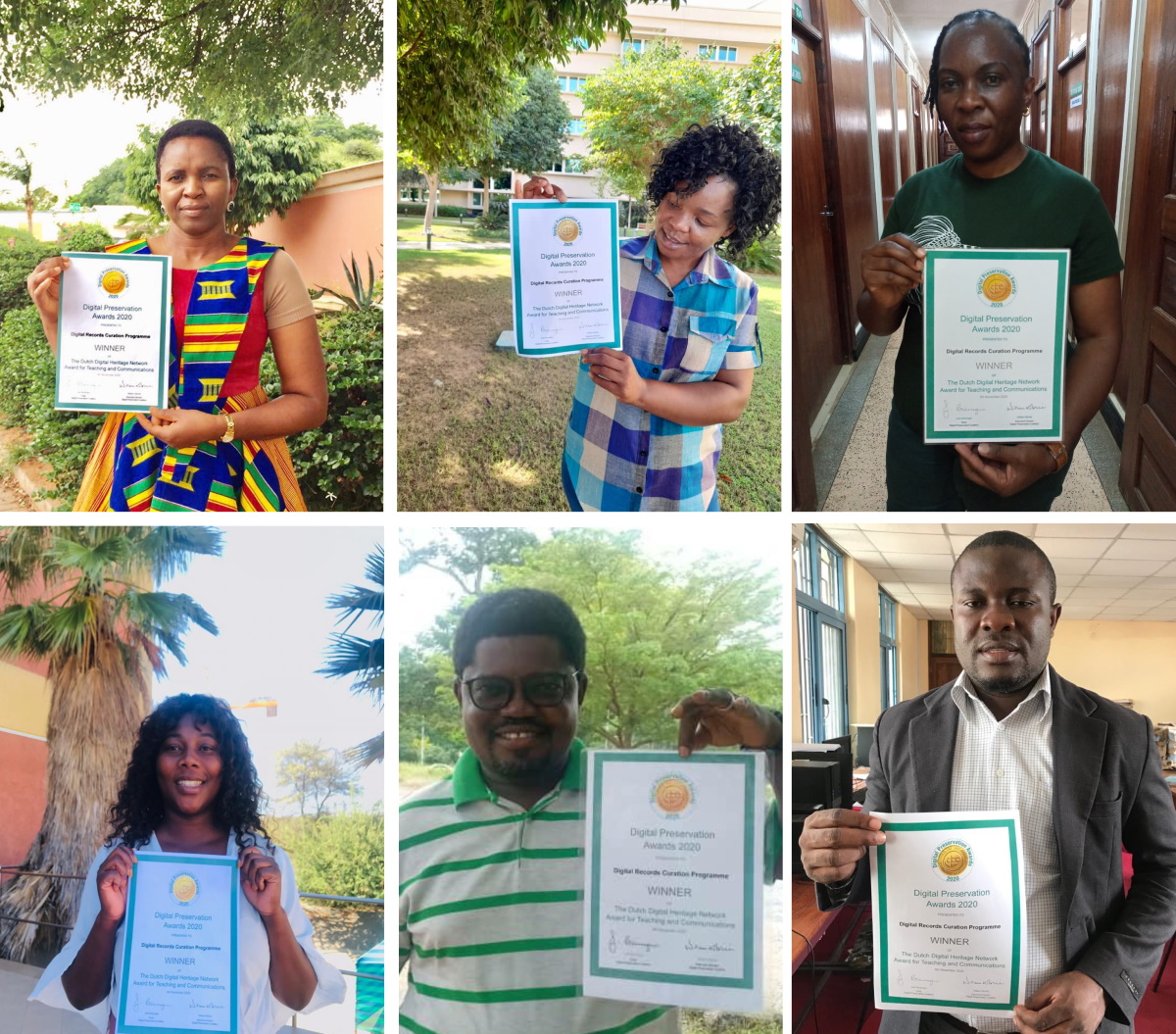
|
2020 Winner of the Dutch Digital Heritage Network Award for Teaching and Communications
|
Lotte Wijsman with ‘The Significant Properties of Spreadsheets: Stakeholder Analysis’
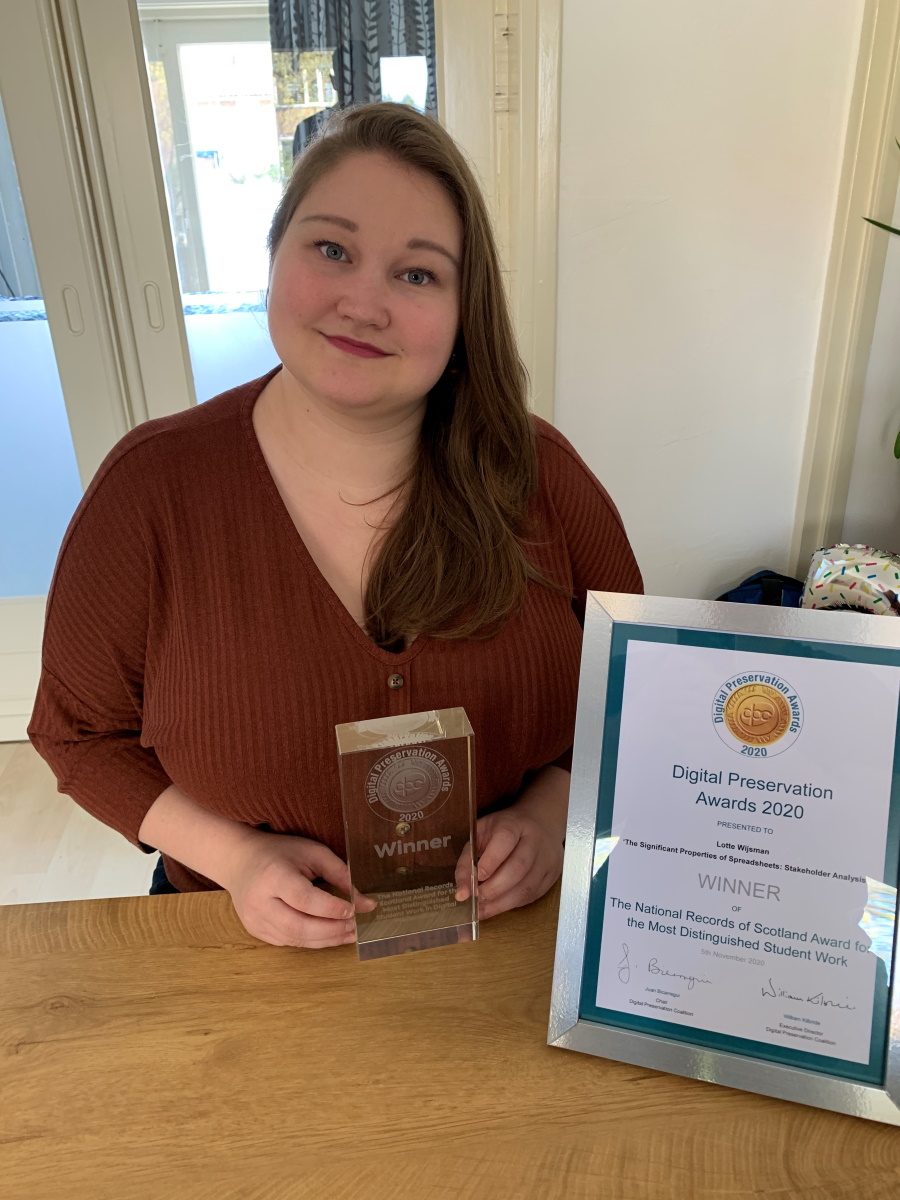
|
2020 Winner of the National Records of Scotland (NRS) Award for the Most Distinguished Student Work in Digital Preservation
|
UNHCR Records and Archives
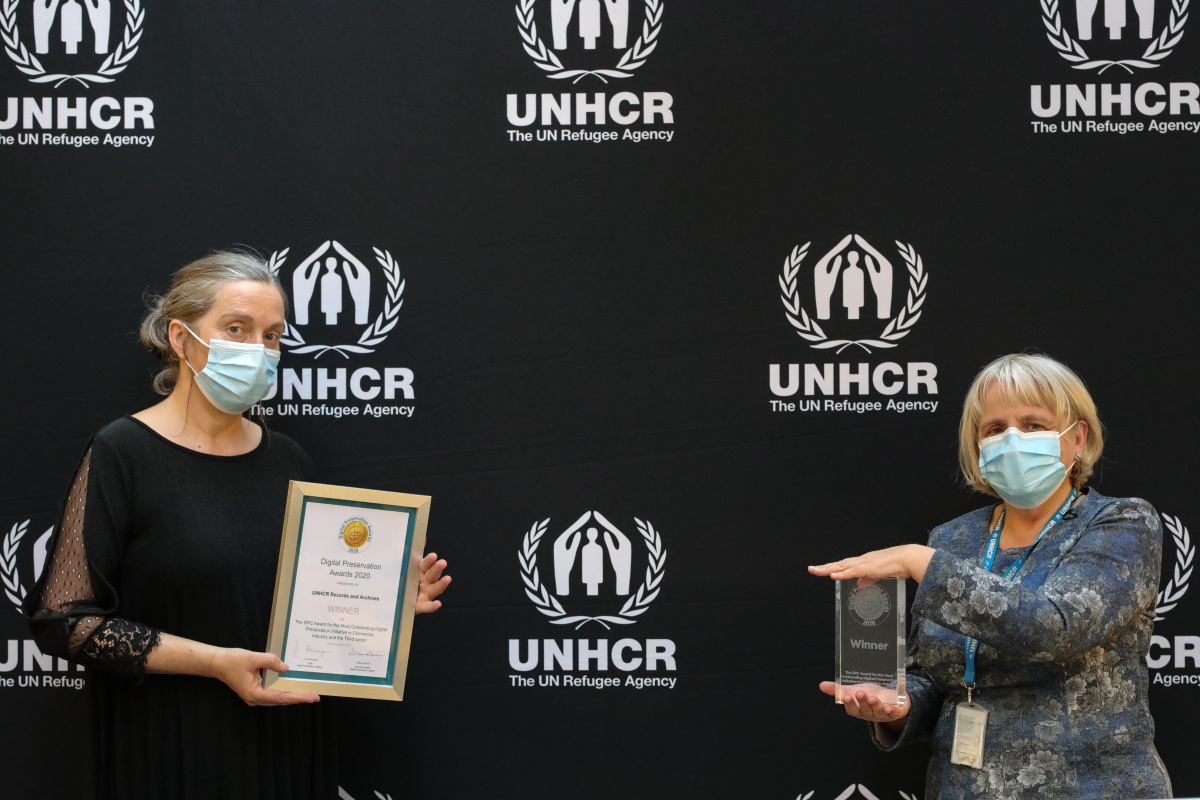
|
2020 Winner of the DPC Award for the Most Outstanding Digital Preservation Initiative in Commerce, Industry and the Third Sector
|
UK Web Archive: celebrating 15 years
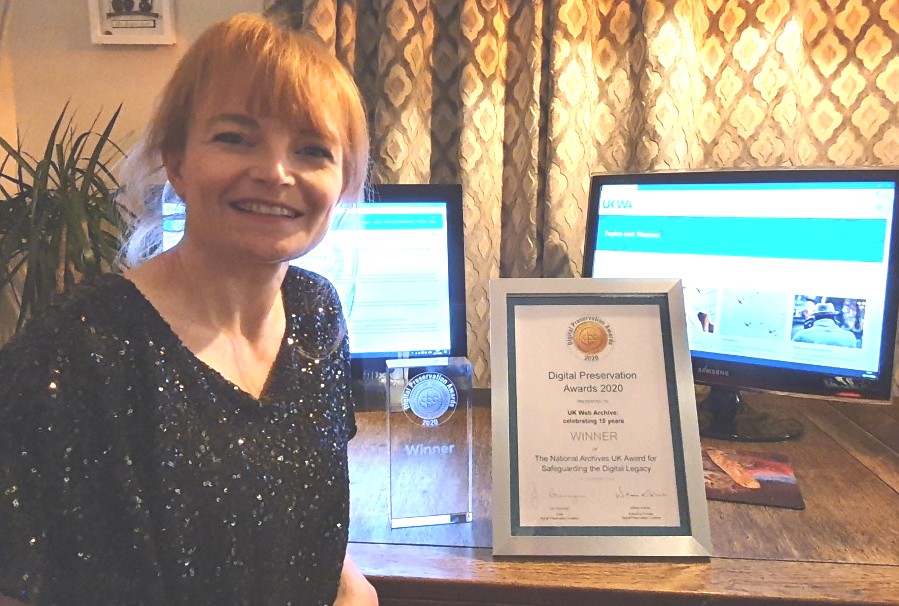
|
2020 Winner of The National Archives (UK) Award for Safeguarding the Digital Legacy
|
Micky Lindlar
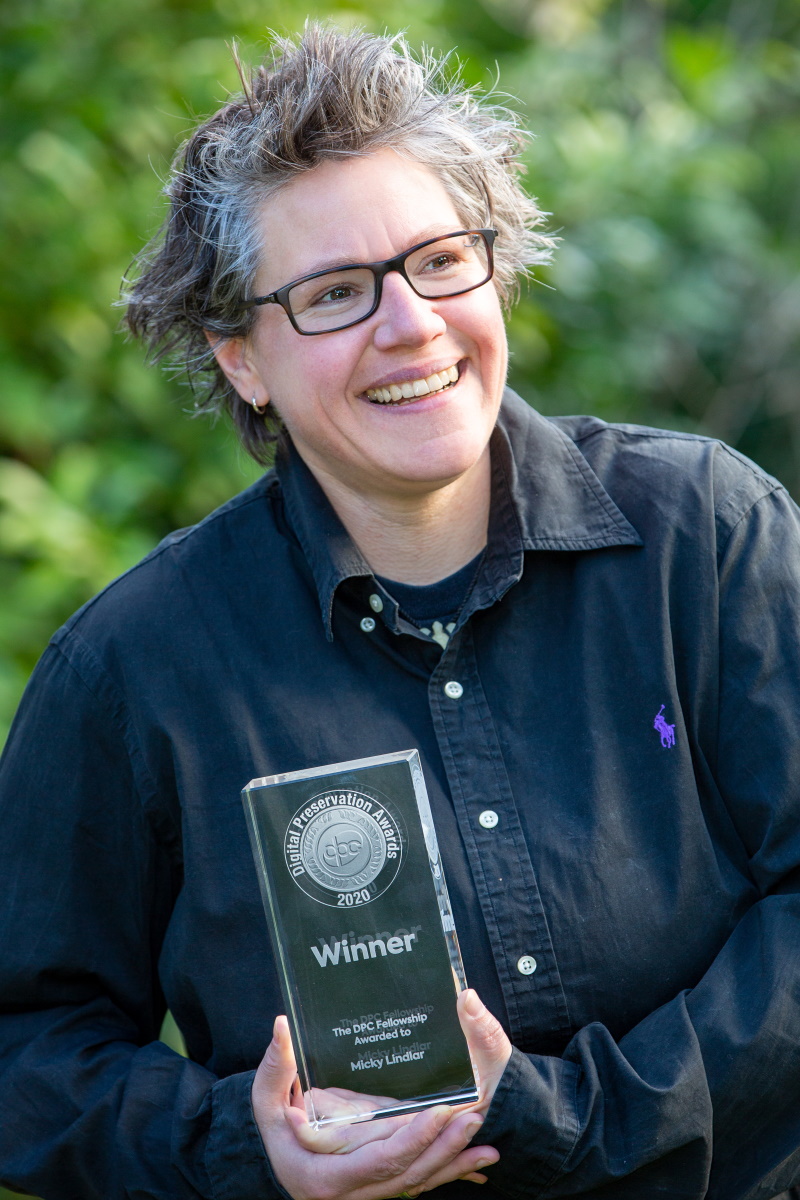 |
2020 The DPC Fellowship Award, presented by Richard Ovenden |
Find out about the Digital Preservation Awards 2020 Finalists
Drawing together the finalists' presentatations from the #WeMissiPRES event in September 2020, hear our Digital Preservation Awards judges as they introduce and reflect on the excellent, inspiring and innovative people and projects they have encountered throughout the awards process.
Watch and learn about each of our incredible finalists as they tell us more about their work.
The International Council on Archives Award for Collaboration and Cooperation
|
The Software Sustainability Institute Award for Research and Innovation
|
The Dutch Digital Heritage Network Award for Teaching and Communications
|
The National Records of Scotland Award for the Most Distinguished Student Work
|
The National Archives Award for Safeguarding the Digital Legacy
|
The DPC Award for the Most Outstanding Digital Preservation Initiative in Commerce, Industry and the Third sector
|
The Digital Preservation Awards are made possible by the expertise and support provided by our international panel of Judges, and funding from our sponsors.
|
Angela Beking, |
Abbie Grotke, |
Roxana Maurer, |
Sheila Morrissey |
|
Neil Chue Hong, |
Natalie Harrower, |
Sally McInnes, |
Marcel Ras, |
|
Susan Corrigall, |
Neil Jefferies, |
Sharon McMeekin, |
Karen Sampson, |
|
Joanna Fleming, |
William Kilbride, |
April Miller, |
Anthea Seles, |
|
Neil Grindley, Jisc |
Kirsty Lingstadt, |
Laura Molloy (Chair), |
John Sheridan, |
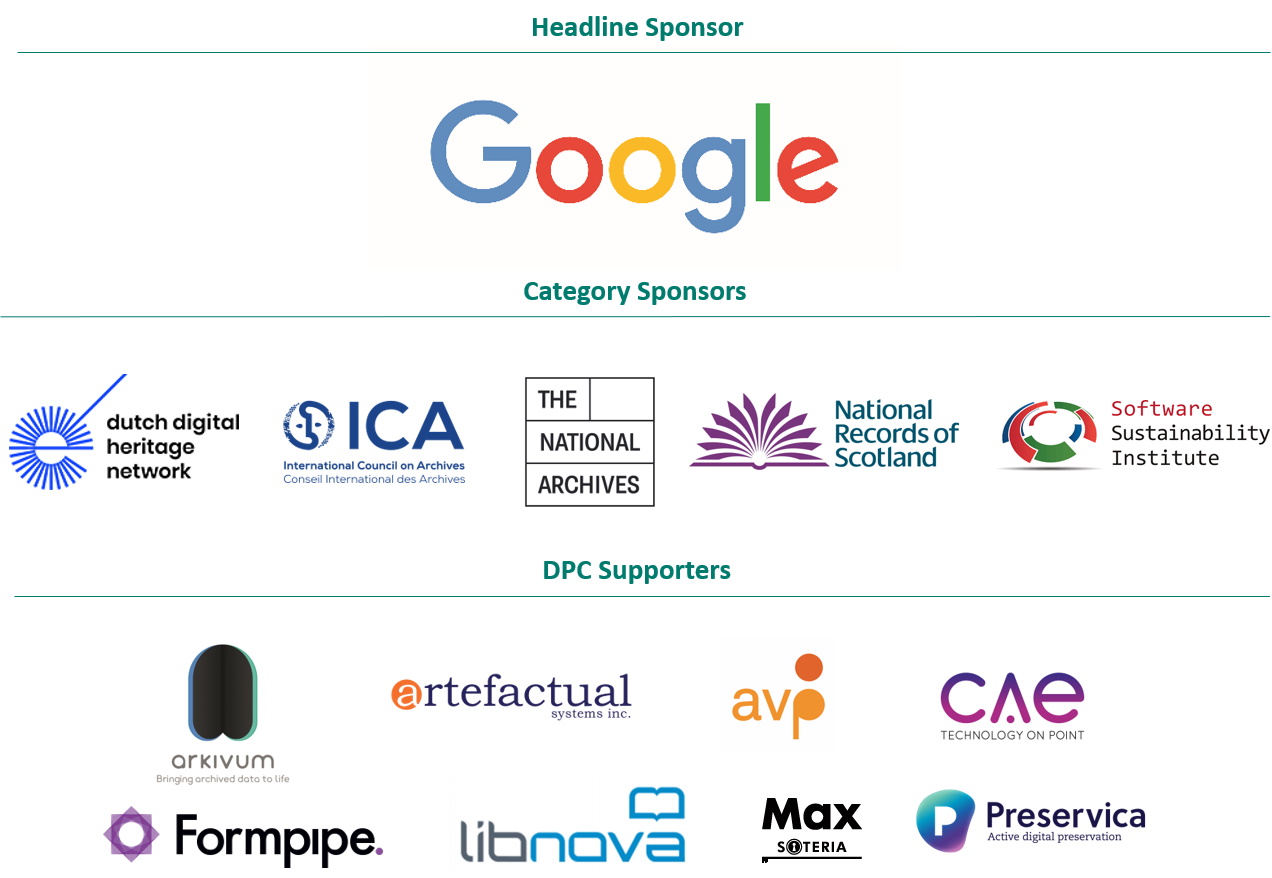
2007 Digital Preservation Award
Accolade for new tool to save digital archives for future generations as DROID wins the 2007 Digital Preservation Award.

An innovative tool to analyse and identify computer file formats has won the 2007 Digital Preservation Award. DROID, developed by The National Archives in London, can examine any mystery file and identify its format. The tool works by gathering clues from the internal 'signatures' hidden inside every computer file, as well as more familiar elements such as the filename extension (.jpg, for example), to generate a highly accurate 'guess' about the software that will be needed to read the file.
Identifying file formats is a thorny issue for archivists. Organisations such as the National Archives have an ever-increasing volume of electronic records in their custody, many of which will be crucial for future historians to understand 21st-century Britain. But with rapidly changing technology and an unpredictable hardware base, preserving files is only half of the challenge. There is no guarantee that today's files will be readable or even recognisable using the software of the future.
Now, by using DROID and its big brother, the unique file format database known as PRONOM, experts at the National Archives are well on their way to cracking the problem. Once DROID has labelled a mystery file, PRONOM's extensive catalogue of software tools can advise curators on how best to preserve the file in a readable format. The database includes crucial information on software and hardware lifecycles, helping to avoid the obsolescence problem. And it will alert users if the program needed to read a file is no longer supported by manufacturers.
PRONOM's system of identifiers has been adopted by the UK government and is the only nationally-recognised standard in its field.
The Digital Preservation Award of £5,000 is sponsored by the Digital Preservation Coalition. This prestigious Award recognises achievement and encourages innovation in the new and challenging field of digital preservation - simply put, preserving things whose very existence depends on computers. The judges chose The National Archives from a strong shortlist of five contenders, whittled down from the original list of thirteen.
Short-listed for the Digital Preservation Award were:
-
LIFE: The British Library.
LIFE (Lifecycle Information for E-Literature) has made a major contribution to understanding the long-term costs of digital preservation, an essential step in helping institutions plan for the future. Its methodology models the digital lifecycle and calculates the costs of preserving digital information for the next 5, 10 or 100 years. Organisations can apply this process to understand costs and focus resources on those items or collections most in need of them.
http://www.ucl.ac.uk/ls/life/1/conference.shtml -
Web Curator Tool software development project: National Library of New Zealand & The British Library.
The web is a huge and interconnected digital asset with which we are all familiar, and one in which material changes and disappears with frightening regularity. Conscious of this problem, the National Library of New Zealand and The British Library worked together in an international collaboration to build this tool, which supports selective and thematic web-harvesting by collaborating users in a library environment. Swift development over just 10 months enabled it to be released as free software for the benefit of the international web-archiving community in September 2006, from webcurator.sf.net.
http://webcurator.sourceforge.net/ -
Active Preservation at The National Archives - PRONOM Technical Registry and DROID file format identification tool: The National Archives of the UK.
One of the fundamental challenges of digital preservation is to understand the technologies required to access digital information, and plan the actions we will need to take to ensure continued access in the future in the face of constant technological change. Is the software needed to read this document still supported by the supplier, and is the format of this digital movie still readable by most computers? PRONOM is a unique and innovative online service which helps to answer questions like these and includes a knowledge base of technical information about over 600 file formats and 250 software tools, which has been developed by The National Archives to answer these challenges.
http://www.nationalarchives.gov.uk/aboutapps/pronom/puid.htm -
PARADIGM (The Personal Archives Accessible in Digital Media): Bodleian Library, University of Oxford, & John Rylands University Library, University of Manchester.
Personal archives are important components of cultural memory, but inexperience in curating their modern counterparts - e-mail, digital photographs, online calendars, blogs and many more - puts the survival of today's personal histories at risk. The diversity and volatility of digital technology far exceeds that of any medium that creators, archivists and researchers have previously worked with. The Paradigm project has worked with politicians, archivists and researchers to investigate these challenges in an exemplar project so that the archives of significant contemporaries can continue to enrich our history.
http://www.paradigm.ac.uk/ -
Digital Repository Audit and Certification: CRL, RLG-OCLC, NARA, the DCC, DPE and Nestor.
As the number of organisations, both public and private, preserving digital information increases, it becomes important to be able to assess how well they are doing and how well-prepared they are for the unknown challenges of the future. The Trustworthy Repositories Audit and Certification (TRAC) Criteria and Checklist (maintained by the US Center for Research Libraries), the nestor project's Criteria Catalogue and the Digital Repository Audit Method Based on Risk Assessment (DRAMBORA) published by the Digital Curation Centre and DigitalPreservationEurope present complementary methods for the self assessment, audit and certification of digital repository infrastructures.
http://www.repositoryaudit.eu/
The prestigious award was presented in a special ceremony at The British Museum on 27 September 2007 as part of the 2007 Conservation Awards, sponsored by Sir Paul McCartney.
Ronald Milne, Chair of the Board of Directors of the Digital Preservation Coalition, which sponsors the award, said: "The National Archives fully deserves the recognition that accompanies this award."
For more information on the two tools please see: the PRONOM Technical Registry and Digital Record Object Identification (DROID) file format identification.
2007 Judges
-
Kevin Ashley (Chair of the Judging Panel), Head of Digital Archives Department, University of London Computer Centre.
-
Michael Day, Research Officer at UKOLN, University of Bath.
-
Helen Hockx-Yu, Programme Manager, Joint Information Systems Committee (JISC).
-
William Kilbride, Research Manager, Glasgow Museums.
-
Andreas Rauber, Associate Professor, Department of Software Technology and Interactive Systems (IFS), The Vienna University of Technology.
-
Chris Rusbridge, Director, Digital Curation Centre (DCC).
-
Helen Shenton, Head of Collection Care, the British Library.
-
Dave Thompson, Digital Curator, Wellcome Library.
2010 Digital Preservation Award
The Digital Preservation Award 2010 was won by Los Alamos National Laboratory and Old Dominion University for the Memento Project.
The Institute for Conservation and the Digital Preservation Coalition (DPC) are delighted to announce that the Memento Project led by Herbert Van De Sompel and colleagues of Los Alamos National Laboratory and Michael Nelson and colleagues of Old Dominion University, USA, has won the Digital Preservation Award 2010.
‘Memento offers an elegant and easily deployed method that reunites web archives with their home on the live web,’ explained Richard Ovenden, chair of the Digital Preservation Coalition. ‘It opens web archives to tens of millions of new users and signals a dramatic change in the way we use and perceive digital archives.’
‘The ability to change and update pages is one of the web’s greatest advantages but it introduces a sort of structured instability which makes it hard to depend on web pages in the long term. For more than a decade services like the UK Web Archive and the Internet Archive have provided a stable but partial memory of a fragment of the web – but users had no way of linking between current content and earlier versions held by web archives.’
‘The Memento project resolves this by letting users set a time preference in their browser. The underlying technology then deploys basic, under-used features of the HTTP protocol to direct users to whichever archived copy of a website most closely matches their request’.
‘The really impressive part of Memento is how it uses existing and widely deployed content negotiation tools embedded within the architecture of the web to connect users with archives’, commented Kevin Ashley, Chair of the Judges for the Digital Preservation Award. ‘Most of the technology required to make the service work is already widely deployed.’
‘The Memento architecture means you no longer need to search archives or go to a special website to recover earlier versions of pages: with Memento our archives are always, already available. The benefit for users is obvious, but in creating simple access it transforms the value and impact of web archiving. In an environment where web archives are widely used and understood, the creation of web archives will seem less like a specialised or esoteric concern.’
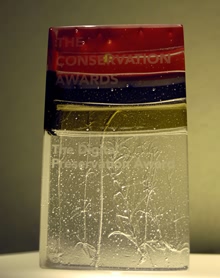 ‘Winning the Digital preservation Award is a really significant achievement’, explained William Kilbride, Executive Director of the Digital Preservation Coalition which sponsored the award.
‘Winning the Digital preservation Award is a really significant achievement’, explained William Kilbride, Executive Director of the Digital Preservation Coalition which sponsored the award.
‘There is no other prize like it, so it attracts genuinely international field and is only awarded after exacting scrutiny. An expert panel subjects ensures a rigorous analysis of each nomination and the whole membership of the DPC is invited to comment on and select their favourite projects. The shortlist, which was announced in Vienna this September included two US-based projects, one Trans-Atlantic blue ribbon task force, a pan European project and an initiative from the National Archives in the UK which gained a huge amount of press attention at the time of the General Election.’
‘To have won the Digital Preservation Award in the context of so many strong candidates should be taken as a significant mark of esteem from colleagues and peers.’
The Digital Preservation Award consists of 4 elements: a cash prize (£2500); a bespoke glass trophy; a miniature of the trophy to be retained by the winner; a certificate which is retained by the winner. Previous winners have included: the National Archives for their Digital Archive Project (2004) with a special commendation for the Camileon project at the Universities of Michigan and Leeds; the PREMIS working group for the PREMIS metadata standard (2005), the National Archives for Pronom and Droid (2007).
Runners up for the award were:
-
Web Continuity: ensuring access to online government information, from The National Archives UK
-
PLATO 3: Preservation Planning Made Simple from Vienna University of Technology and the PLANETS Project
-
The Blue Ribbon Task Force on Sustainable Digital Preservation and Access
-
Preserving Virtual Worlds, University of Illinois at Urbana Champaign with Rochester Institute of Technology, University of Maryland, Stanford University and Linden Lab in the United States
The Digital Preservation Award is one of five awards organised by a working party of the Institute for Conservation (ICON), known collectively as The Conservation Awards. Each award celebrates different aspect of the highest standards of conservation skills, innovation and research, collections care and digital preservation. The Awards, which were launched in 1991, are supported by Icon and sponsored by The Pilgrim Trust, the Digital Preservation Coalition (DPC), and the Anna Plowden Trust. Since 2005, the Awards have also been generously supported by Sir Paul McCartney.
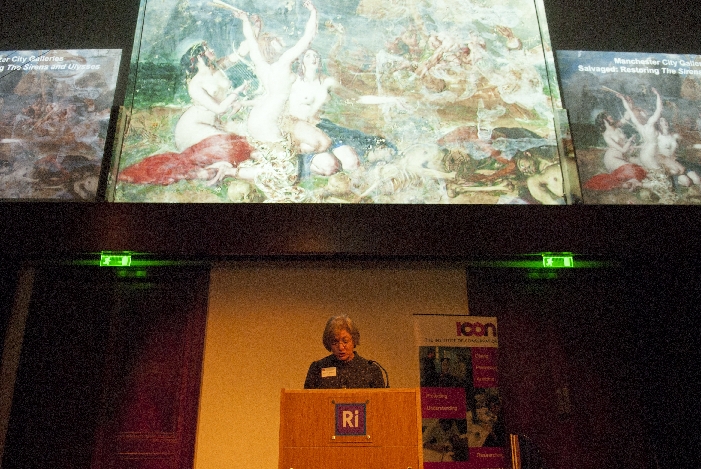
Alison Richmond, ICON CE, commented: ‘In today’s current difficult economic climate, with many of our cultural heritage organisations under threat, it is incredibly important to celebrate the outstanding quality of current conservation and research being undertaken in Britain and further afield today. The winning projects clearly demonstrate that conservation of our cultural is not an end in
The Awards were presented at a ceremony followed by a drinks reception and held at the Royal Institution of Great Britain, London on 1 December 2010. Roy Clare (CEO of the Museums Libraries and Archives Council), speaking at the awards, said: ‘The art and science of conservation are vital to sustaining public understanding and enjoyment of cultural heritage and collections of all kinds, for this and future generations. The profession faces growing demands to respond openly and ever-more creatively to new standards, technologies, public expectations and resource constraints. The context is challenging, but I welcome ICON’s determination to work with members and partners to shape effective strategies for ensuring a vibrant future for conservation.’itself, but a passport to wider access, and deeper knowledge and enjoyment of our heritage. ’
The Judges
-
Kevin Ashley, Director, Digital Curation Centre, Edinburgh University
-
Adrian Brown, Assistant Clerk of the Records, Parliamentary Archives
-
William Kilbride, Executive Director, Digital Preservation Coalition
-
Pip Laurenson, Head of Time-based Media Conservation, Tate
-
Zoe Lock, Lead Technologist, the Technology Strategy Board
-
Eefke Smit, International STM Publishers Association, The Netherlands
-
Dave Thompson, Digital Curator, The Wellcome Library
-
Matthew Woollard, Director Designate, the UK Data Archive
-
Richard Wright, Senior Research Engineer, BBC
Watch interviews with shortlisted candidates:
Digital Preservation Awards 2012
DPC is delighted to announce the winners of the 2012 Digital Preservation Awards.
The Digital Preservation Awards celebrate the excellence and innovation that will help to ensure our digital memory is available tomorrow. It was first awarded in 2004 as one of the Conservation Awards and it has been presented on four occasions (2004, 2005, 2007 and 2010), sponsored by the Digital Preservation Coalition with the Institute for Conservation. Although based on the Conservation Awards the Digital Preservation Award has always been distinctive in how it implements the criteria and eligibility.
At a prestigious ceremony, the Digital Preservation Coalition (DPC) celebrated its tenth anniversary by recognising initiatives and individuals from around the world that have made an outstanding contribution to safeguard digital resources for the future. Three agencies received awards for their exceptional contribution to ensuring the long-term security of digital collections: the University of London Computer Centre for their pioneering and popular ‘Digital Preservation Training Programme’; the PLANETS project for its ground-breaking and innovative technologies; and the Archaeology Data Service at the University of York for its outstanding work securing valuable but vulnerable research data.
The three awards were presented this year were:
-
The DPC Decennial Award for an outstanding contribution to digital preservation
-
The DPC Award for Teaching and Communications
-
The DPC Award for Research and Innovation
Meet the Winners:
Archaeology Data Service
The DPC Decennial Award for an outstanding contribution to digital preservation
Awarded specially to mark the tenth anniversary of the founding of the DPC, the Decennial award recognizes the most outstanding work over the decade that the DPC has existed. An intense international competition followed and finalists from New York, Washington and London were selected after a painstaking assessment by an expert panel. But when Dame Lynne Brindley announced the winner this evening, it was the Archaeology Data Service at the University of York that came out on top. The Archaeology Data Service is an innovative group based in the Archaeology Department of the University of York. ADS has developed and thrived with an innovative business model that allows it to preserve an extraordinary range of data while providing free access to all comers. It ensures the longevity of data that would rapidly be lost or obsolete, and it has an impressive track record of research and innovation.
University of London Computer Centre Digital Preservation Training Programme (DPTP)
The Award for Teaching and Communications
Presented by Oliver Morley, Chief Executive of the National Archives, a small team from the University of London Computer Centre who run the Digital Preservation Training Programme (DPTP) - an entry-level, introductory course that develops critical thinking about digital preservation, received this award. The course is designed to help all working in information management to understand effective approaches to the challenges of digital preservation, and enables students to assess the models and examples in the context of their own organisations.
PLANETS Project
The Award for Research and Innovation
Martyn Harrow, Chief Executive of JISC presented this award to the PLANETS project. PLANETS brought together memory institutions, small businesses, major technology providers, and research institutions from across Europe to build practical services and tools to help ensure long-term access to digital cultural and scientific assets. It established the not-for-profit Open Planets Foundation to provide the digital preservation community with services, ongoing support, and a sustainable future for its Open Source results. It advanced the state-of-the-art in digital preservation and has permanently changed the digital preservation landscape by shifting the focus to practical, sustainable solutions that are soundly supported by practice-driven research.
William Kilbride, Executive Director of the DPC said: “These awards are important in showcasing the creative solutions that have been developed towards digital preservation. Digital preservation is critical. We know that significant parts of the economy, industry, research, government and the public life depend on the opportunities information technology creates, but the rapid churn in technology means data is also surprisingly fragile. We are the first generation that’s had to think about handing on a digital legacy, so we need to act quickly to develop the skills and techniques that will ensure our legacy is protected.”
The contributions of nine other exceptional finalists were also marked in the ceremony hosted by Richard Ovenden, Chair of the DPC and Deputy Director of the Bodleian Libraries at University of Oxford, one of the world’s premiere memory institutions. It is one of many agencies that have joined the Digital Preservation Coalition to help develop the new skills necessary to preserve their growing digital collections.
Digital Preservation Awards 2012 Finalists
|
For an outstanding contribution to Teaching and Communication in digital preservation in the last 2 years:
|
For an outstanding contribution to Research and Innovation in digital preservation in the last 2 years:
|
|
For the most Outstanding Contribution to Digital Preservation in the last decade:
|
|
In different ways, the winners and finalists of the Digital Preservation Awards demonstrate an unassuming creativity that not only deserves to be better known and celebrated: it will be vital for the on-going exploitation of high value data.
The Digital Preservation Awards are sponsored by the Digital Preservation Coalition, which is an advocate and catalyst for digital preservation, enabling our members to deliver resilient long-term access to content and services, and helping them derive enduring value from digital collections. We raise awareness of the importance of the preservation of digital material and the attendant strategic, cultural and technological issues. The DPC is a not-for-profit membership organisation and we support our members through knowledge exchange, capacity building, assurance, advocacy and partnership. Our vision is to make our digital memory accessible tomorrow.
We thank our panel of Judges for their support and contributions to the DPA2012 process:
|
Kevin Ashley (DCC) |
Louise Lawson (Tate) |
Bram van der Werf (Open Planets Foundation) |
|
Adrian Brown (Parliamentary Archives) |
Ant Miller (BBC) |
Paul Wheatley (Leeds University) |
|
Rachel Bruce (JISC) |
Caroline Peach (BLPAC) |
Matthew Woollard (UK Data Archive) |
|
William Kilbride (DPC) |
Dave Thompson (Wellcome) |
|
Digital Preservation Awards Roll of Honour
2022 - Winner of the International Council on Archives Award for Collaboration and Cooperation, presented by Meg Phillips and Neil Grindley
ARCHIVER Project
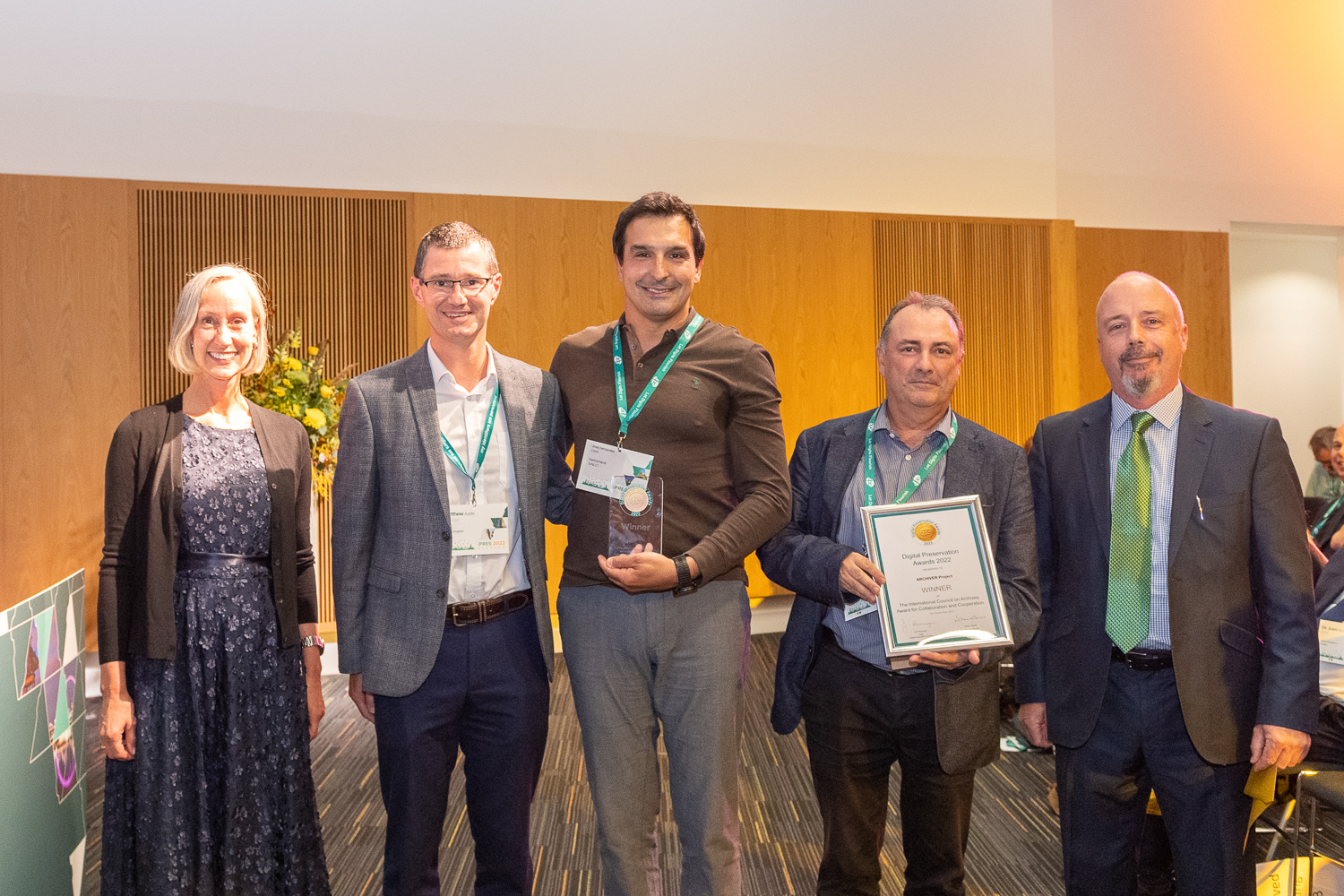
2022 - Winner of the Software Sustainability Institute (SSI) Award for Research and Innovation, presented by Neil Chue Hong and Kirsty Lingstadt
The effective preservation of archaeological virtual reconstructions
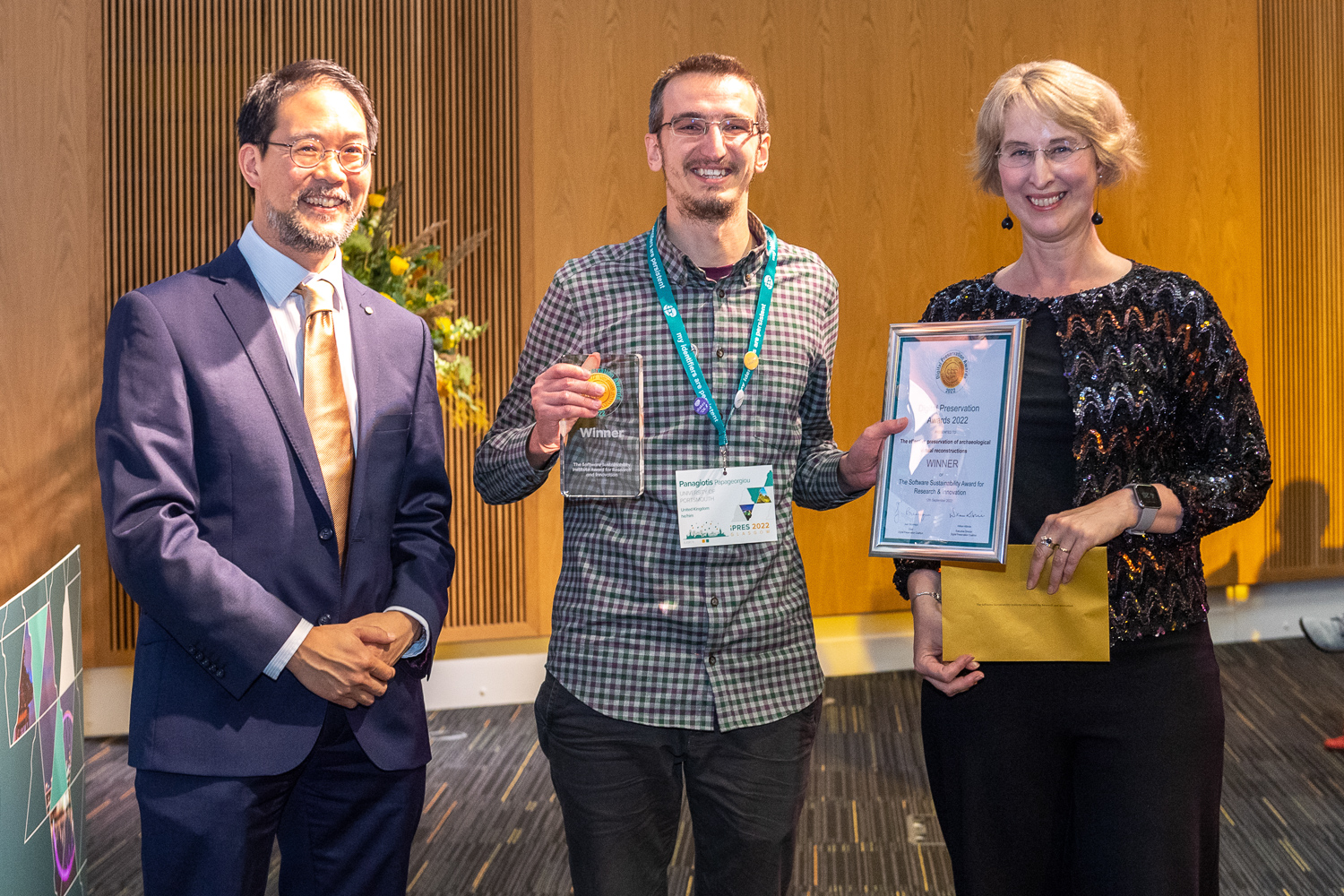
2022 - Winner of the Dutch Digital Heritage Network Award for Teaching and Communications, presented by Remco van Veenendaal and Roxana Maurer
Learning through doing: building digital preservation skills in Wales
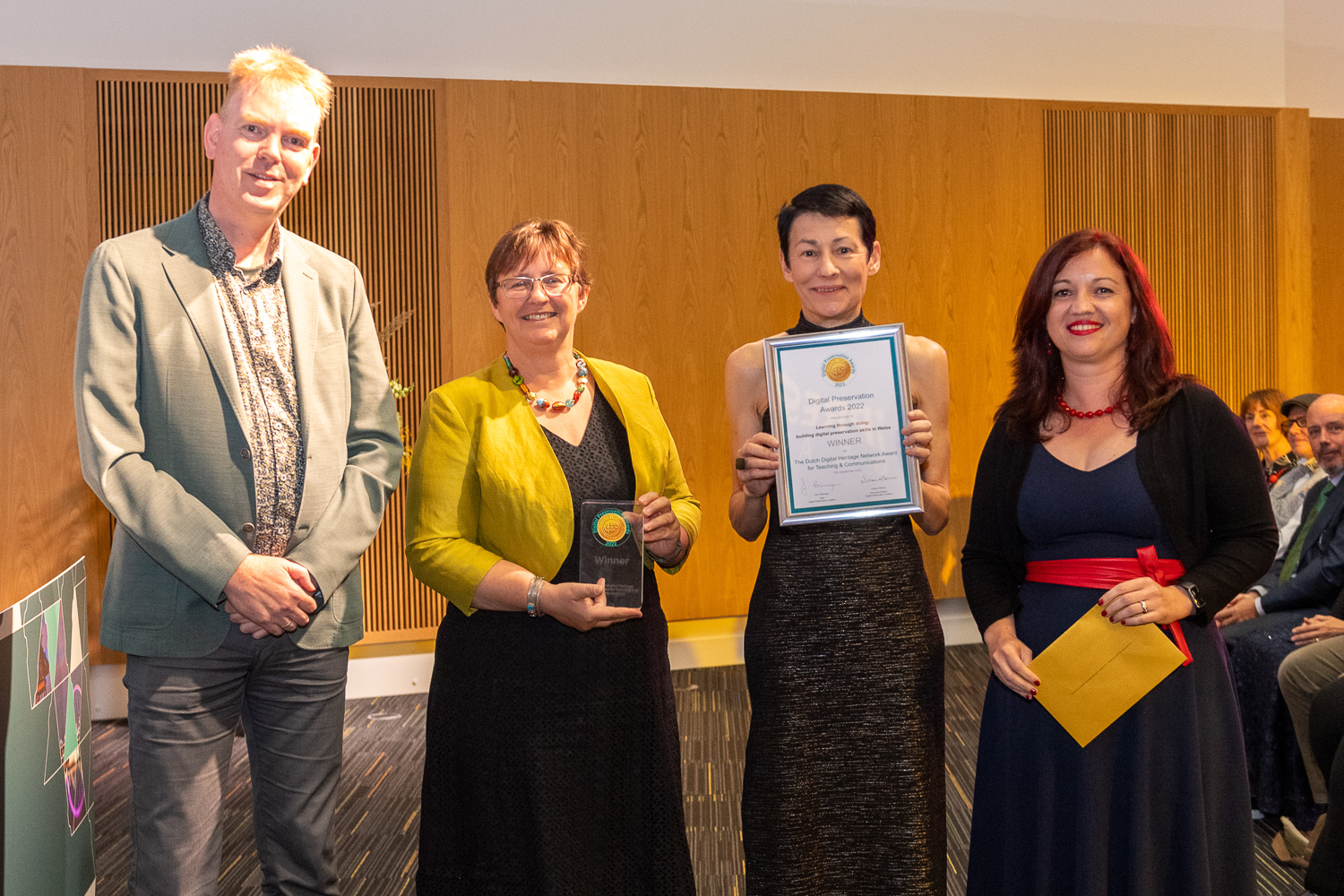
2022 - Winner of the The National Archives (UK) Award for the Most Distinguished Student Work in Digital Preservation, presented by April Miller and Lotte Wijsman
sasha arden with 'Access to Artistic Content on CD-ROMs,' award accepted by Sarah Cook.
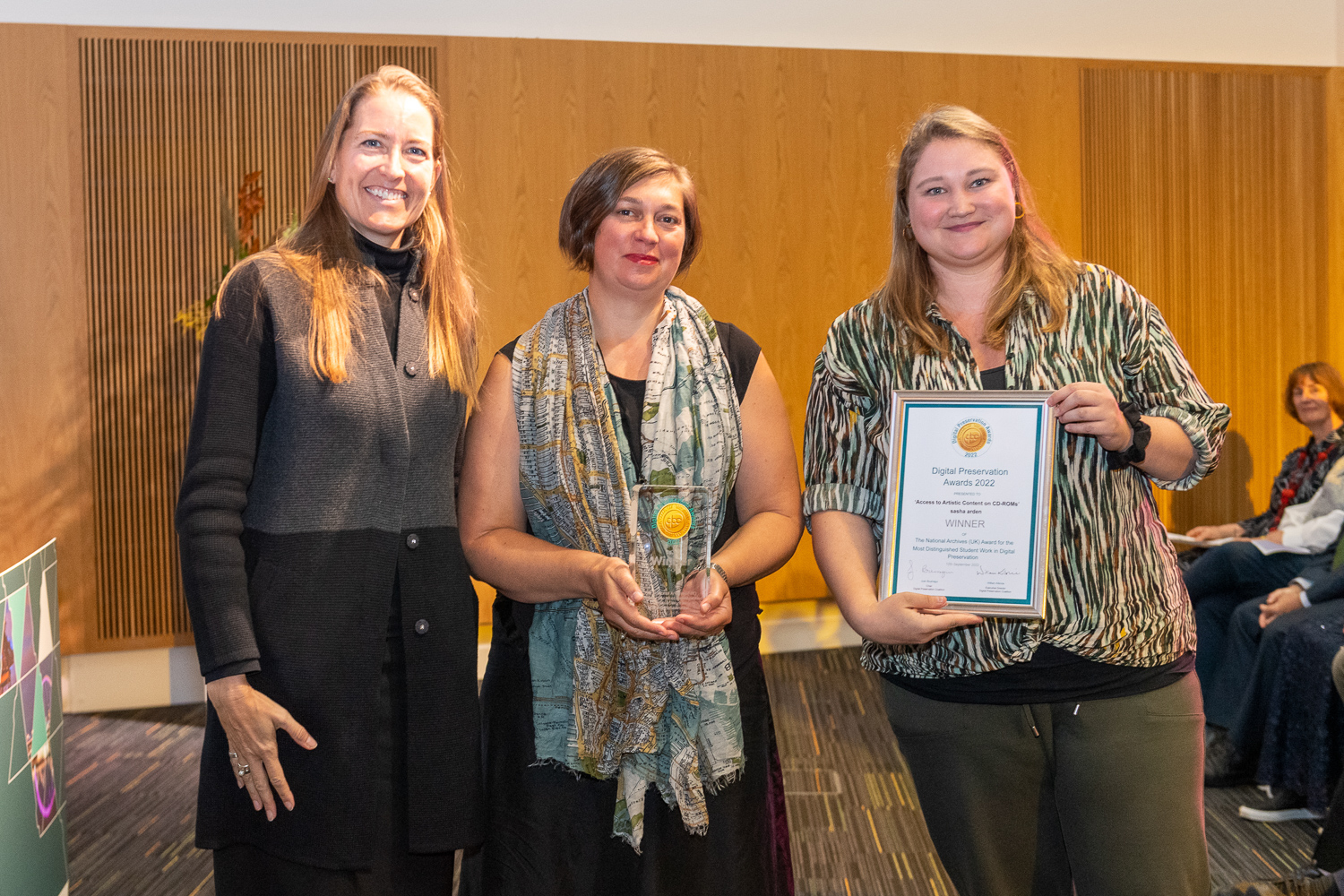
2022 - Winner of the Research Data Alliance Award for the Most Outstanding Digital Preservation Initiative in Commerce, Industry and the Third Sector, presented by Connie Clare and Karen Sampson
National Centre for Truth & Reconciliation Digital Preservation Program
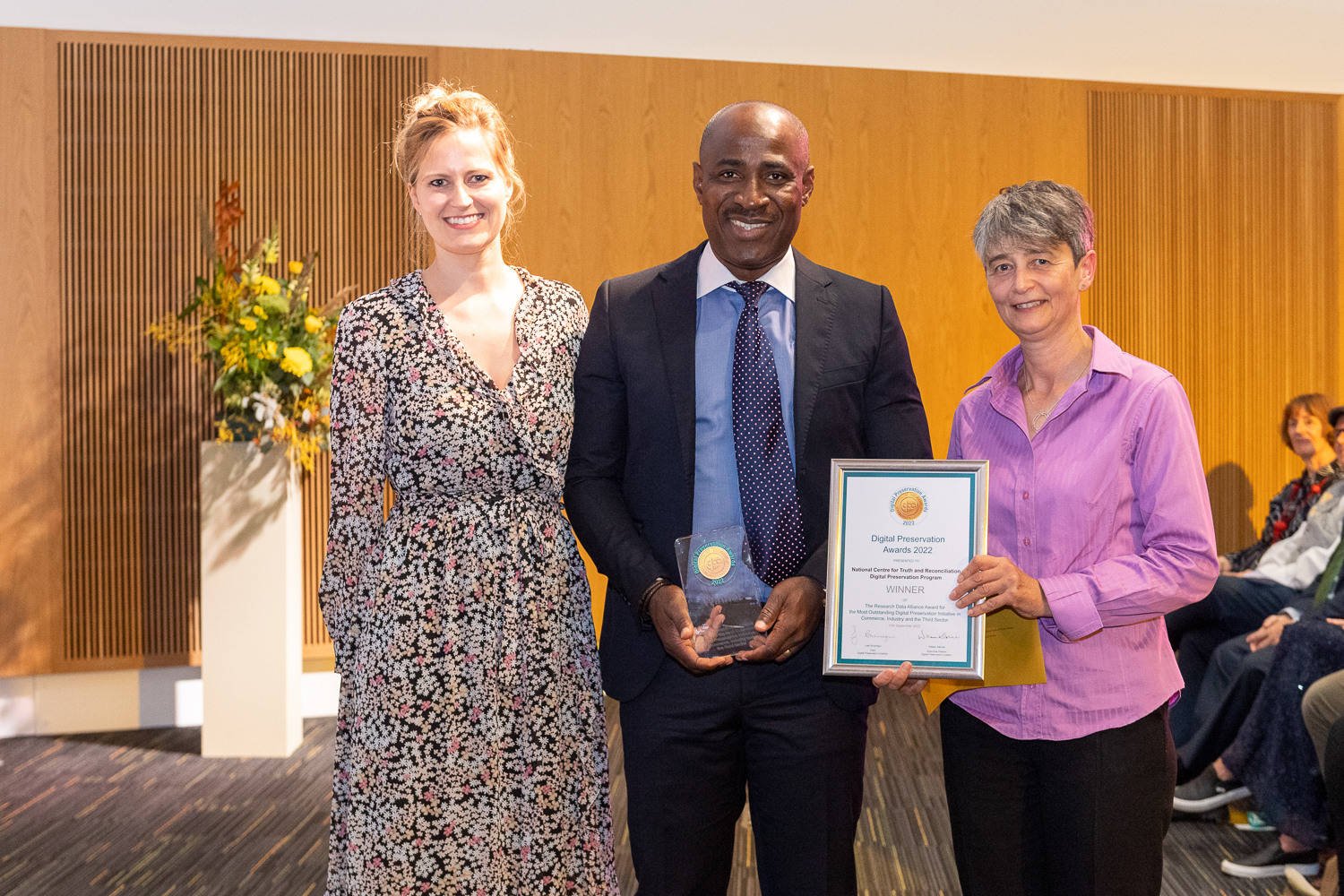
2022 - Winner of the Award for Safeguarding the Digital Legacy, presented by Kieran O'Leary and Patricia Sleeman
Archiving Reproductive Health
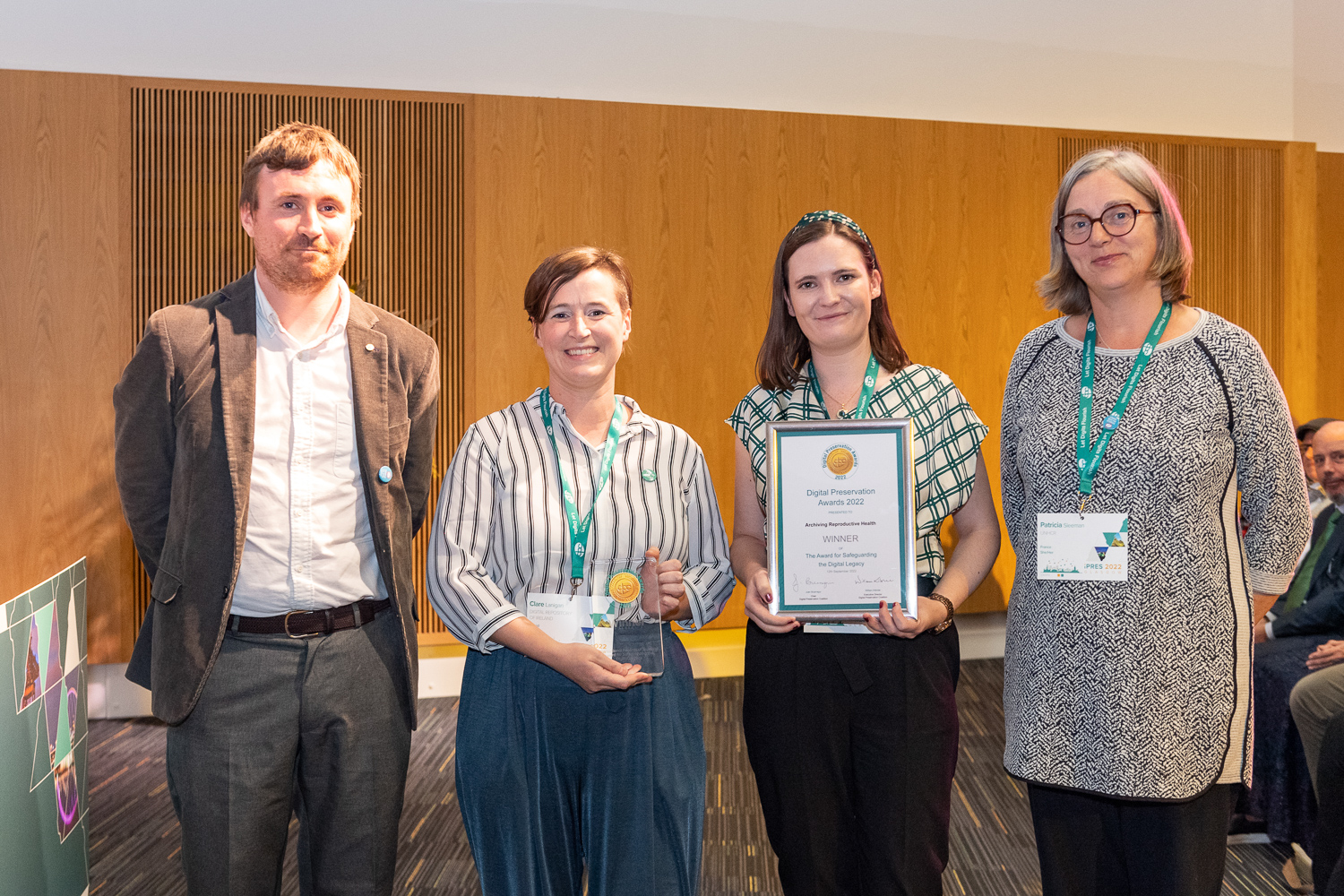
2022 - Winner of the DPC 20th Anniversary Award, presented by Kevin Ashley and Edith Halvarsson
PREMIS Data Dictionary and related resources
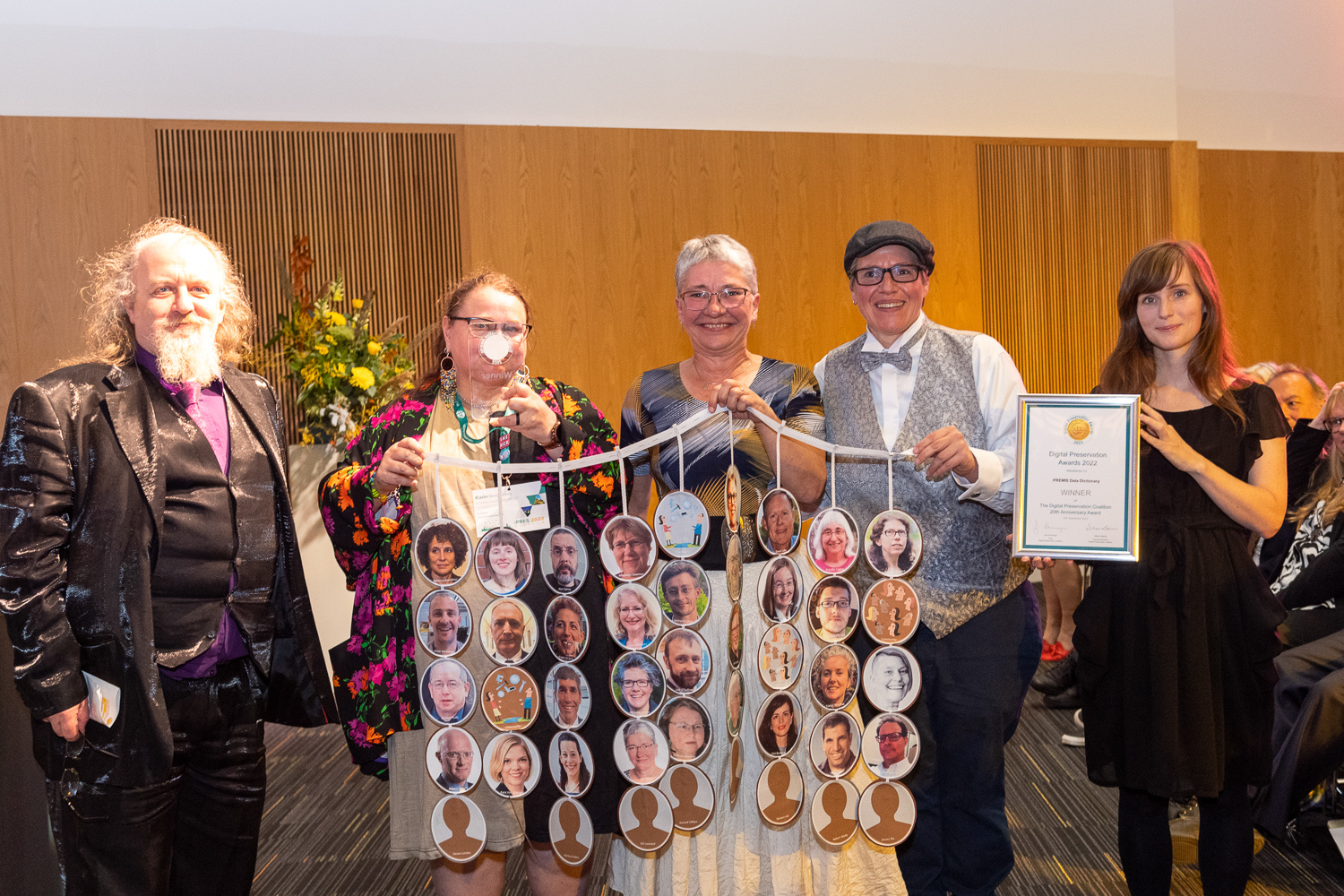
2022 - The DPC Fellowship Award, presented by Micky Lindlar and Barbara Sierman
Left to right (top): Neil Beagrie, Adrian Brown, Dr. Denise de Vries
Left to right (bottom): Nancy Y McGovern, Prof. Zhang Xiaolin
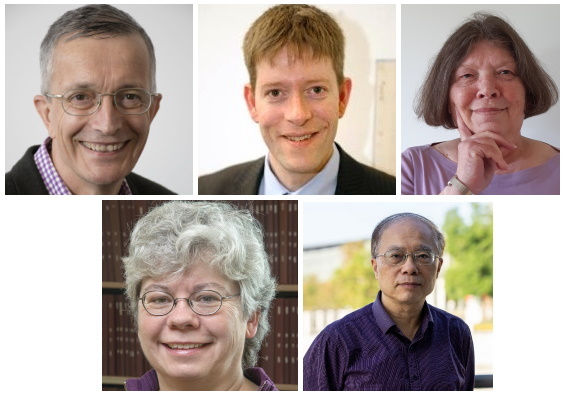
2020 - Winner of the International Council on Archives Award for Collaboration and Cooperation, presented by Anthea Seles and Neil Grindley
NDSA Levels of Digital Preservation Revision Project

2020 - Winner of the Software Sustainability Institute (SSI) Award for Research and Innovation, presented by Neil Chue Hong and Sally McInnes
Levels of Born Digital Access

2020 - Winner of the Dutch Digital Heritage Network Award for Teaching and Communications, presented by Marcel Ras and Sheila Morrissey
Digital Records Curation Programme

2020 - Winner of the National Records of Scotland (NRS) Award for the Most Distinguished Student Work in Digital Preservation, presented by Susan Corrigall and Angela Beking
Lotte Wijsman with ‘The Significant Properties of Spreadsheets: Stakeholder Analysis’

2020 - Winner of the DPC Award for the Most Outstanding Digital Preservation Initiative in Commerce, Industry and the Third Sector, presented by Karen Sampson and Neil Jefferies
UNHCR Records and Archives

2020 - Winner of The National Archives (UK) Award for Safeguarding the Digital Legacy, presented by John Sheridan and April Miller
UK Web Archive: celebrating 15 years

2020 - The DPC Fellowship Award, presented by Richard Ovenden
Micky Lindlar

2018 - The Software Sustainability Institute (SSI) Award for Research and Innovation, presented by Neil Chue Hong, SSI and Natalie Harrower, Digital Repository of Ireland
Stanford University Libraries; ePADD

The DPC Award for Teaching and Communications, presented by Sally McInnes, National Library of Wales and Neil Grindley, Jisc
Jennifer Allen, Matthew Farrell, Shira Peltzman, Alice Prael and Dorothy Waugh; The Archivist’s Guide to Kryoflux

The National Records of Scotland (NRS) Award for the Most Distinguished Student Work in Digital Preservation, presented by Laura Mitchell, NRS and Laura Molloy, University of Oxford
Anna Oates; University of Illinois at Urbana-Champaign

The Open Data Institute (ODI) Award for the Most Outstanding Digital Preservation Initiative in Commerce, Industry and the Third Sector, presented by David Beardmore, ODI and Sheila Morrissey, Portico
Crossrail and Transport for London; Archiving Crossrail

The National Archives Award for Safeguarding the Digital Legacy, presented by Valerie Johnson, The National Archives and Neil Jefferies
IFI Irish Film Archive; IFI Loopline Project

The DPC Fellowship Award, presented by Richard Ovenden, Bodleian Libraries
Barbara Sierman

2016 - The Software Sustainability Institute (SSI) Award for Research and Innovation: NCDD and NDE, ‘Constructing a network of nationwide facilities together’ presented by Neil Chue Hong, SSI and Dave Tarrant, ODI
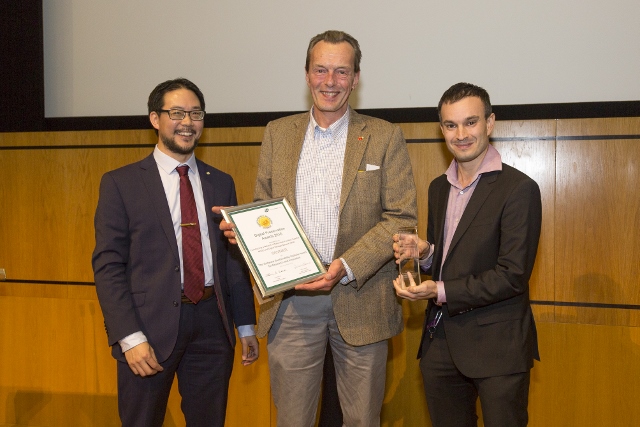
2016 - The NCDD Award for Teaching and Communications: The National Archives and The Scottish Council on Archives: ‘Transforming Archives/Opening Up Scotland’s Archives', presented by Marcel Ras, NCDD and Margriet van Gorsel, Dutch National Archives
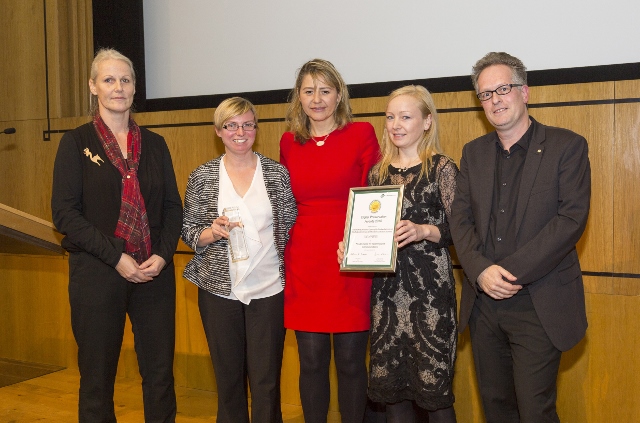
2016 - The DPC Award for the Most Distinguished Student Work in Digital Preservation: Anthea Seles, University College London and ‘The Transferability of Trusted Digital Repository Standards to an East African context’ presented by Daniela Duca, Jisc and Steve Daly, BBC
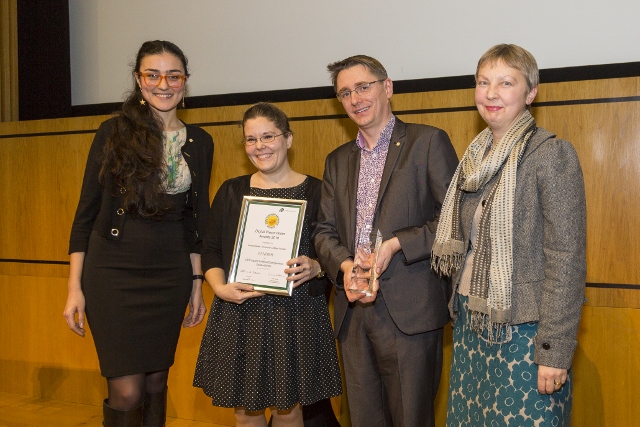
2016 - The DPC Award for the Most Outstanding Digital Preservation Initiative in Industry: HSBC, ‘Global Digital Archive System (GDA)’presented by Tim Gollins, National Records of Scotland and Sharon McMeekin, DPC
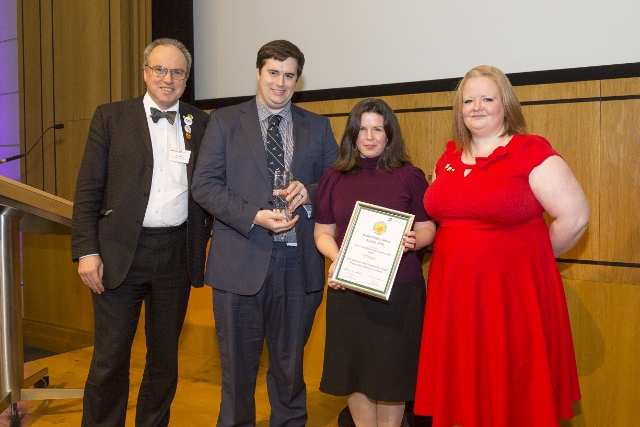
2016 - The National Archives Award for Safeguarding the Digital Legacy: Amsterdam Museum and Partners, ‘The Digital City revives: A case study of web archaeology’ presented by John Sheridan, The National Archives and Louise Lawson, Tate
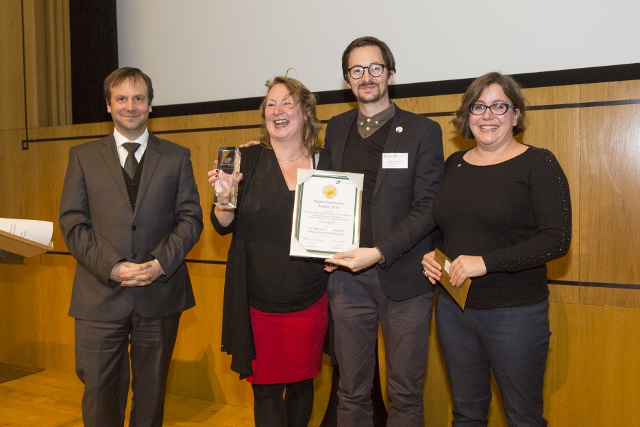
2016 - The DPC Fellowship Award: Brewster Kahle, Internet Archive presented to Chris Booth by Richard Ovenden
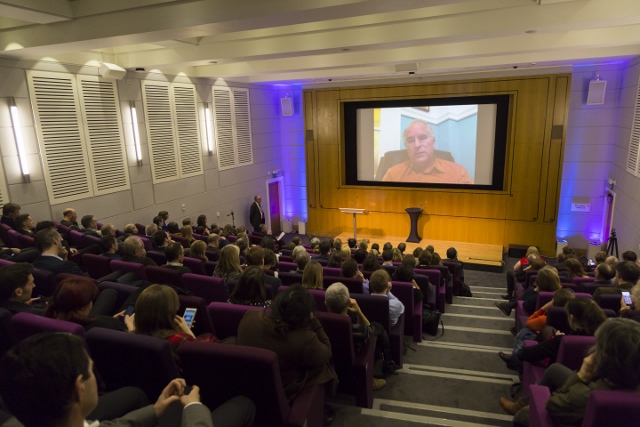
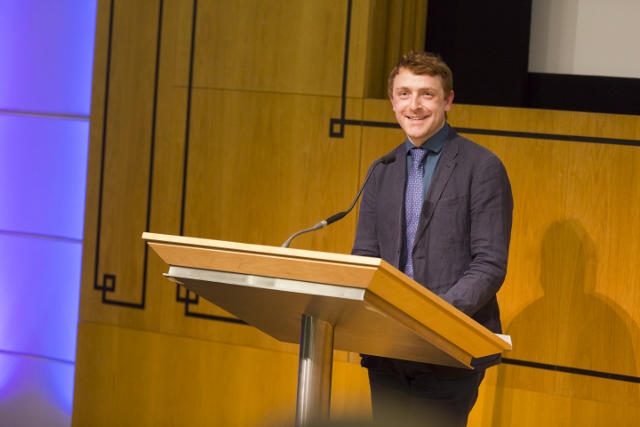
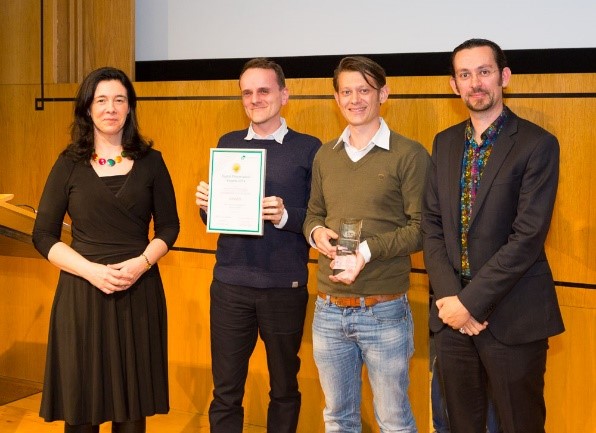
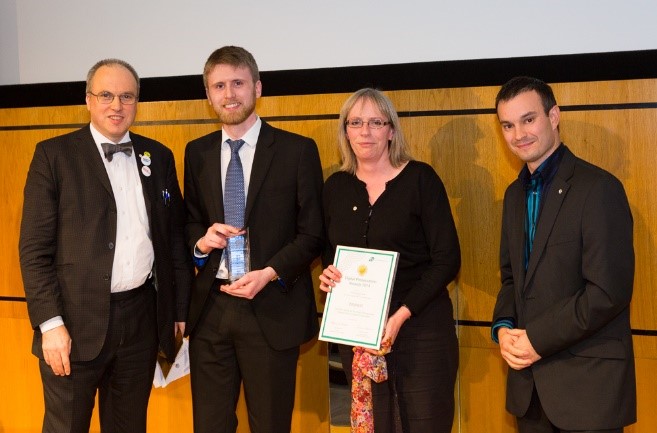
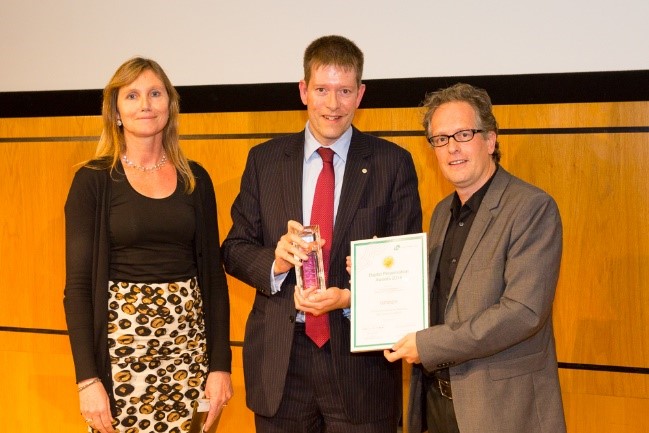
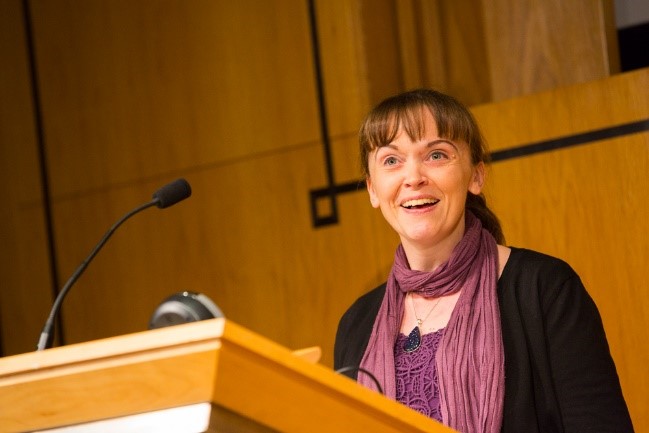
2012 – Archaeology Data Service (Decennial Award for An Outstanding Contribution to Digital Preservation).
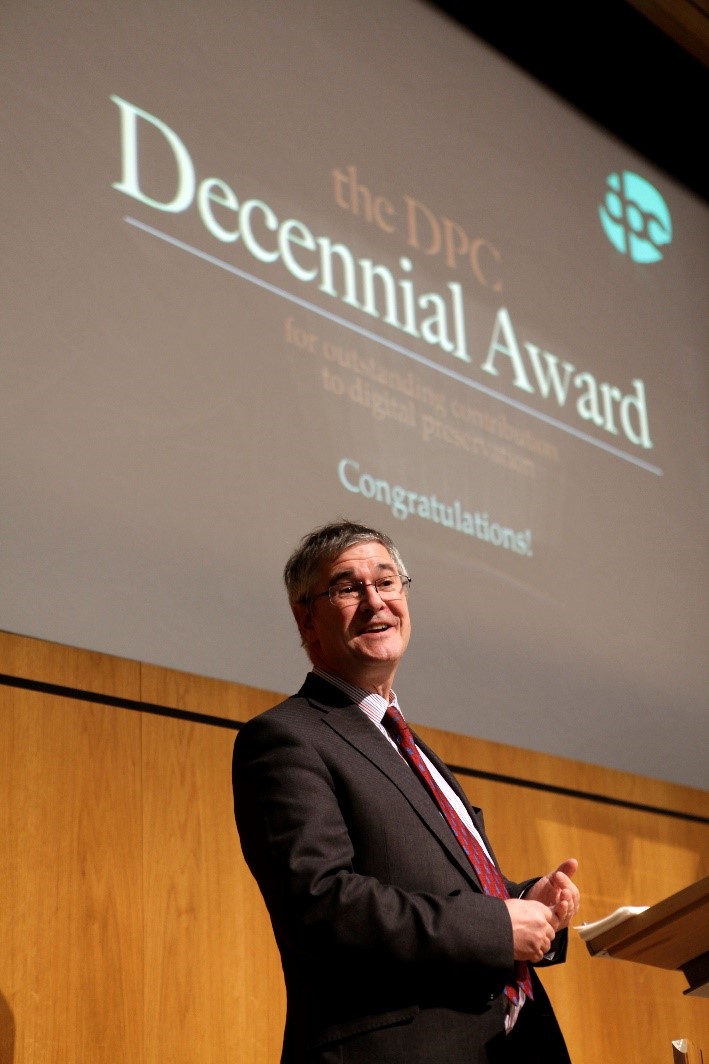
2012 – Digital Preservation Training Programme (Award for Teaching and Communications).
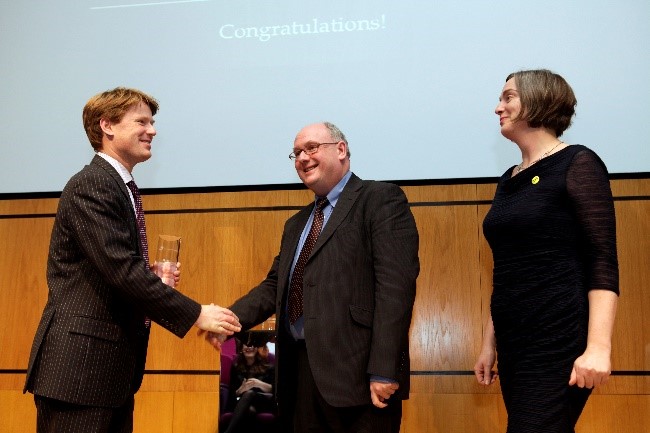
2012 – The PLANETS Project (Award for Research and Innovation).
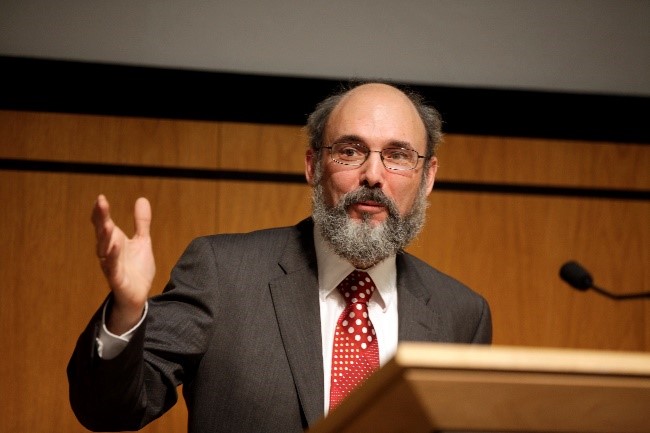
2010 – The Los Alamos National Laboratory and Old Dominion University for the Memento Project.
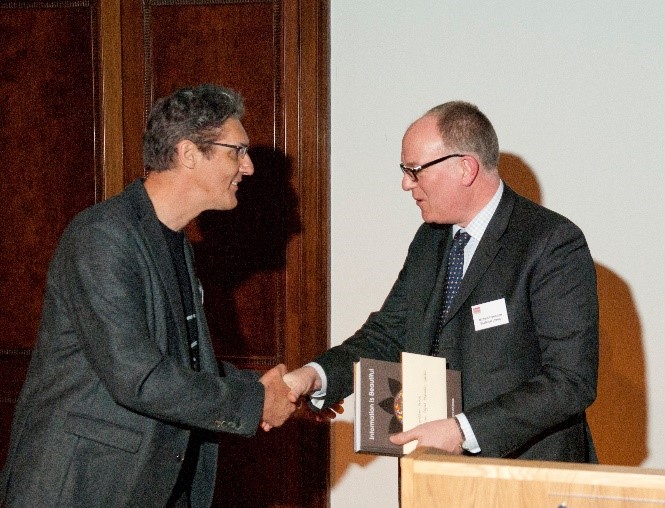
2007 – The National Archives for the PRONOM and DROID projects.
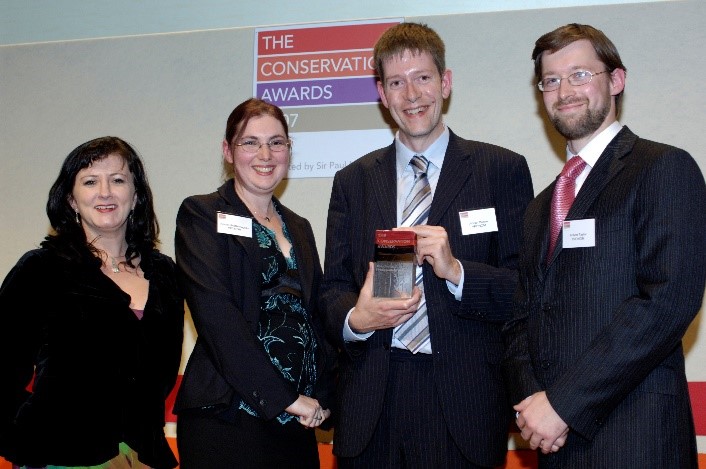
2005 – PREMIS – the Preservation Metadata: Implementation Strategies Working Group.
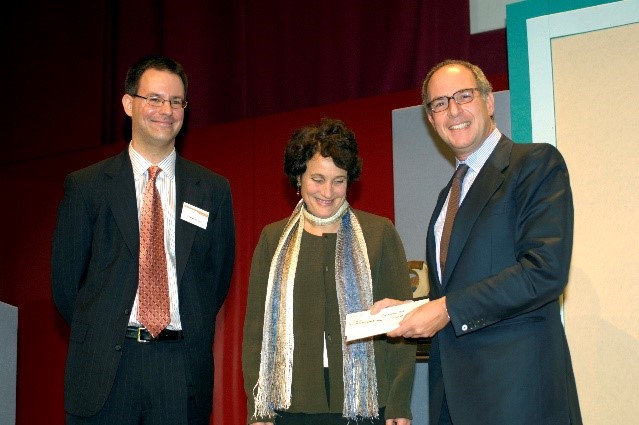
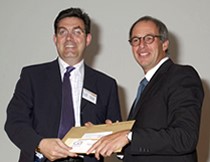
2004 – The National Archives, The Digital Archive project.
Digital Preservation Awards 2014
Meet the winners
Four agencies walked away with awards for their exceptional contribution to ensuring the long-term security of digital collections:
The University of Freiburg and partners with ‘bwFLA Functional Long Term Archiving and Access.’
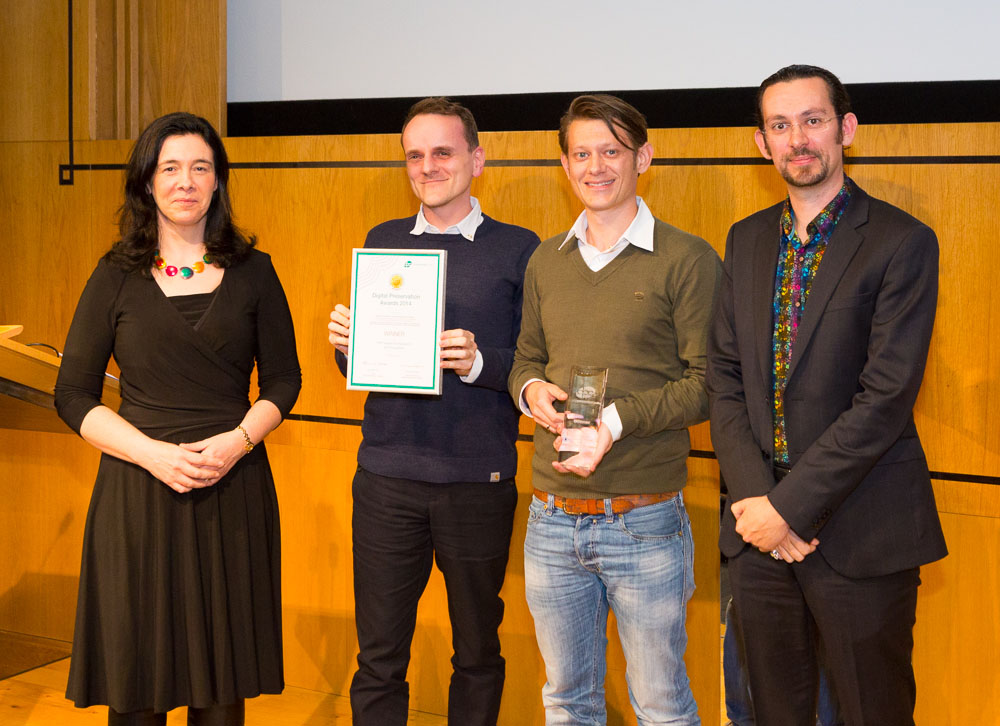 |
2014 winner of the OPF Award for Research and Innovation
|
Alasdair Bachell from the University of Glasgow with ‘Game Preservation in the UK.’
|
|
2014 Winner of the DPC Award for the Most Distinguished Student Work in Digital Preservation
|
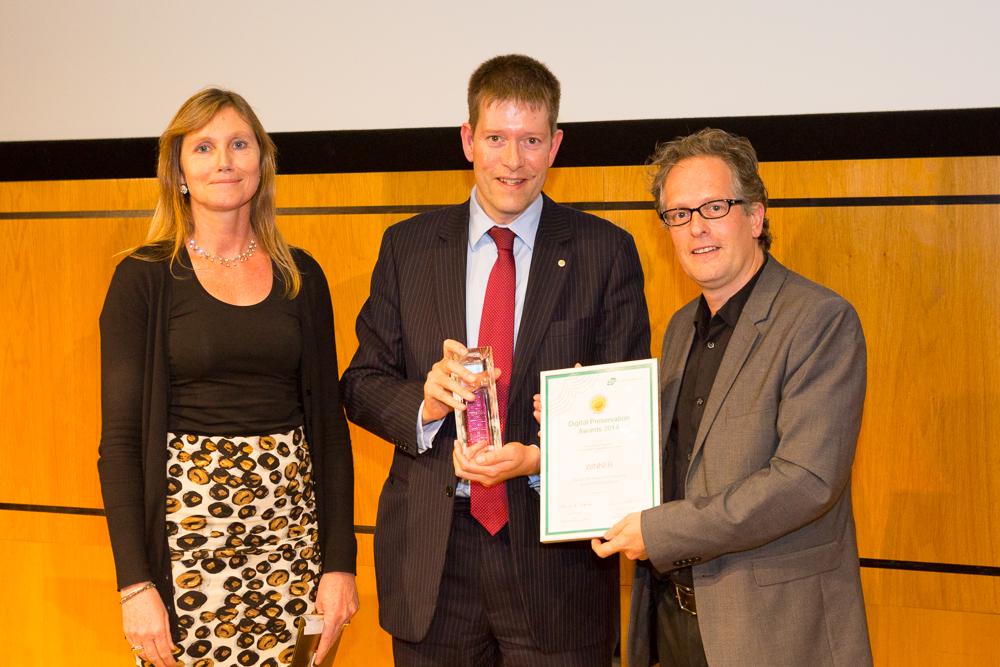 |
2014 Winner of the NCDD Award for Teaching and Communications
|
University of Manchester for their ‘Carcanet Press Email Archive.’
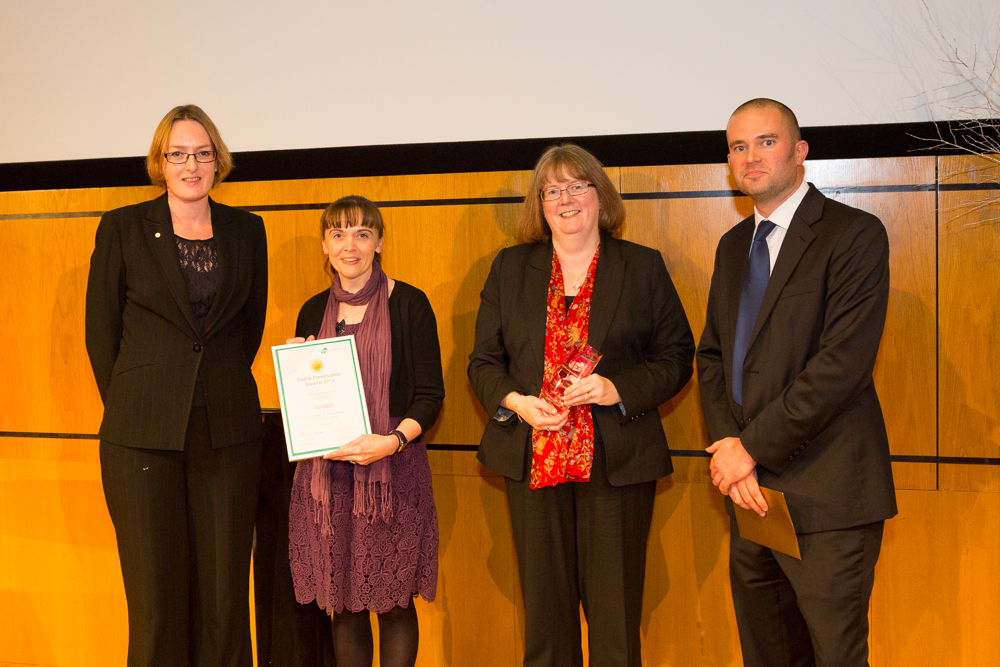 |
2014 Winner of the DPC Award for Safeguarding the Digital Legacy
|
The contributions of nine other exceptional finalists were also marked in the ceremony introduced by Robert Kiley, Head of Digital Services at the Wellcome Library, one of the world's major resources for the study of medical history.
Digital Preservation Awards 2014 Finalists
|
OPF Award for Research and Innovation
|
NCDD Award for Teaching and Communication
|
|
DPC Award for the Most Distinguished Student Work in Digital Preservation
|
DPC Award for Safeguarding the Digital Legacy
|
The DPC extends grateful thanks to our international panel of Judges who made DPA2014 a possibility:
|
Sandra Collins, National Library of Ireland |
Dave Tarrant, ODI |
Marcel Ras, NCDD |
|
Maureen Pennock, British Library |
Tim Gollins, The National Archives (UK) |
Dave Thompson, Wellcome Library |
|
Louise Lawson, Tate |
William Kilbride, DPC |
Paul Wheatley |
|
Rachel Bruce, Jisc |
Ed Fay, OPF |
Manuela Speiser, European Commission |
|
|
Steve Daly, BBC |
|































































































































